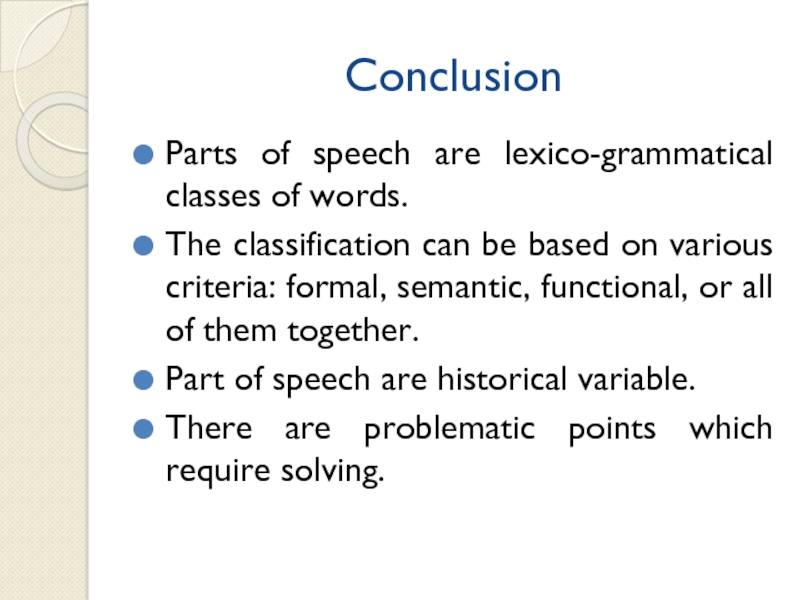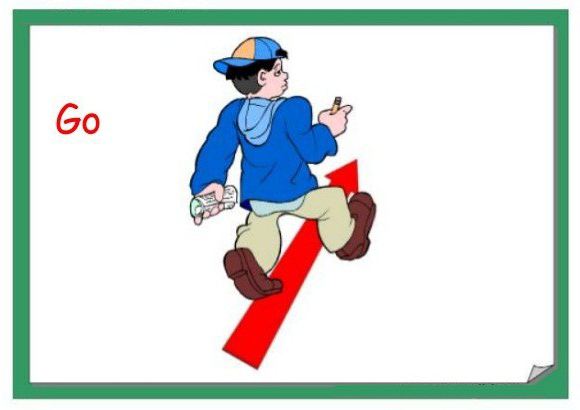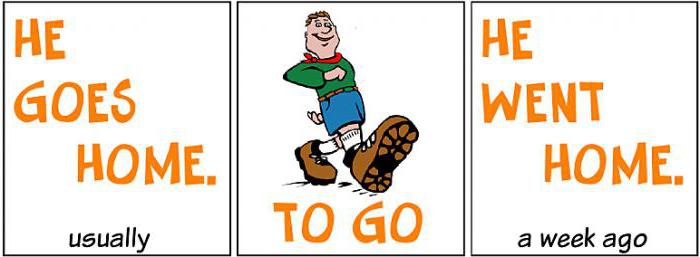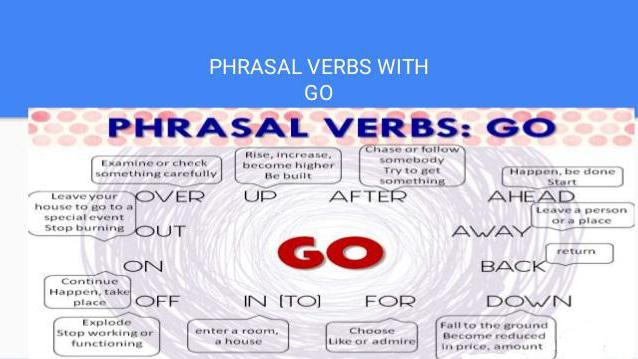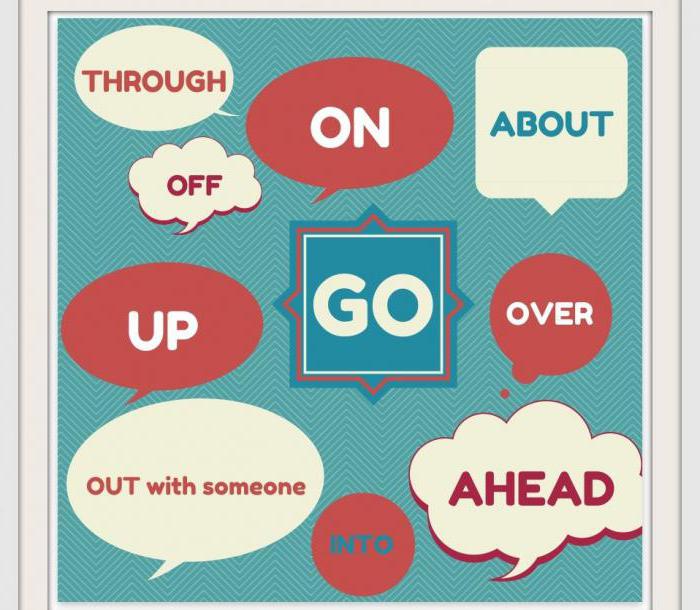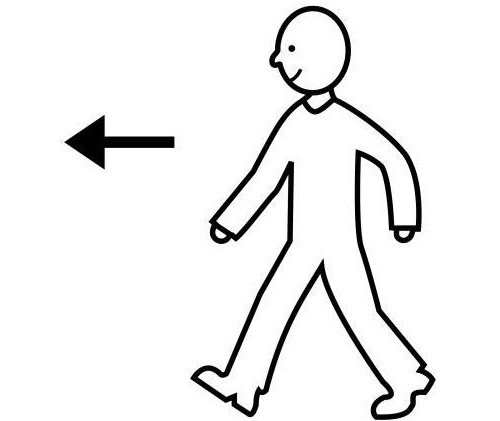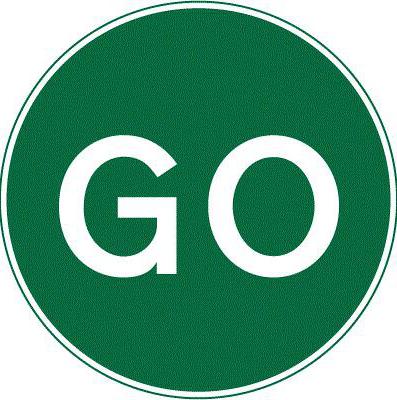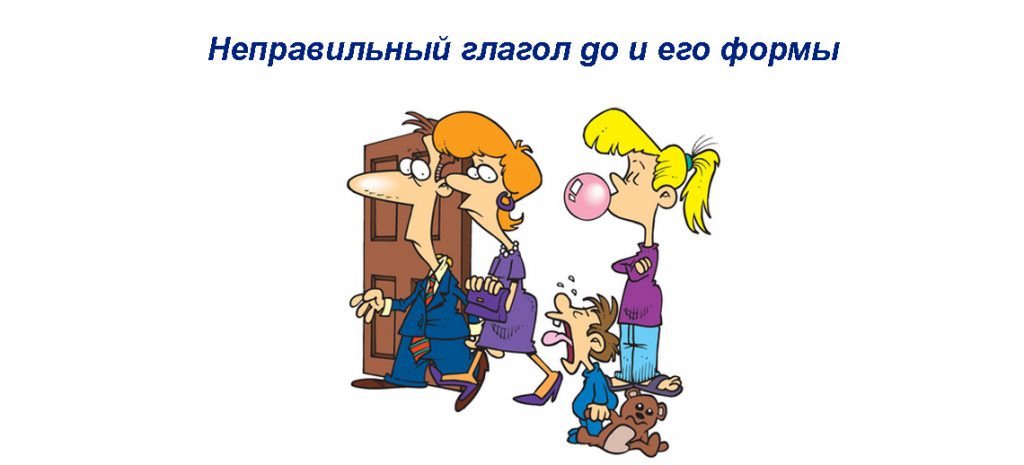1. excursion(экскурсия) (excursion, т.к. они идут на экскурсию, а не на выставку, например, экспонатов)
2. brochures(брошюры) (brochures, т.к. leaflets раздают на улице)
3. beaches(пляжи) (beaches, т.к. песчанными(sandy) бывают пляжи)
4. package(комплексный) (package, т.к. это устойчивое словосочетание со словом каникулы(holidays), означающее — «отдых с полным комплексом услуг»)
5. view(вид) (view, т.к. есть предлог of)
6. book(забронировать) (book, т.к. слово употреблено в значении «заказать»)
7. passengers(пассажиры) (passengers, т.к. люди находятся в самолете, следовательно в данный момент они пассажиры)
8. prolong(продлить) (prolong, т.к. это слово более узкое по значению, чем удлинять(extend))
9. shade(тень) (shade, т.к. shadow — это темная фигура, отбрасываемая предметом, а shade — прохладная тёмная область, куда не попадает солнце)
10. take(взять) (take, т.к. это устойчивое словосочетание — take a taxi)
11. rented(арендовать) (rented, т.к. арендует коттедж, а не нанимают(hire) человека)
12. scenery(пейзаж) (scenery, т.к. окружающая обстановка/декорации(setting) обычно используется в театральной лексике)
Предложения:
1. There was a fantastic exhibition in the Louvre. (В лувре была потрясающая выставка).
2. I’m going to hand out leaflets on saving energy this weekend. (Я собираюсь раздавать листовки об энергосбережении в эти выходные).
3. Malta is well-known for its rocky coasts. (Мальта известна своими скалистыми побережьями).
4. Some children bring a packed lunch to school. (Некоторые дети приносят с собой в школу упакованный ланч).
5. There was some wonderful scenery around the resort we were staying in. (Вокруг курорта, где мы остановились есть некоторые замечательные пейзажи).
6. My brother is good with his hands and can fix anything. (У моего брата золотые руки и он может починить что угодно).
7. Some air travellers may suffer from swollen ankles on long flights. (Некоторые путешественники по воздуху могут страдать от отеков ног при длительном перелете).
8. Long-lasting bad weather can extend the number of miserable days in this month. (Продолжительная непогода может увеличить количество ненастных дней в этом месяце).
9. She was frightened when she saw a shadow behind her. (Она испугалась, когда увидела тень позади нее).
10. After the bank robbery, the police did their best to catch the thieves. (После ограбления банка, полиция сделала все возможное, чтобы поймать воров).
11. We hired a guide near the airport. (Мы наняли гида неподалеку от аэропорта).
12. The hotel was located in a fantastic setting by the sea. (Отель был расположен в фантастическом месте на берегу моря).
Select your language
Suggested languages for you:
Lerne mit deinen Freunden und bleibe auf dem richtigen Kurs mit deinen persönlichen Lernstatistiken
Jetzt kostenlos anmelden

Words don’t only mean something; they also do something. In the English language, words are grouped into word classes based on their function, i.e. what they do in a phrase or sentence. In total, there are nine word classes in English.
Word class meaning and example
All words can be categorised into classes within a language based on their function and purpose.
An example of various word classes is ‘The cat ate a cupcake quickly.’
-
The = a determiner
-
cat = a noun
-
ate = a verb
-
a = determiner
-
cupcake = noun
-
quickly = an adverb
Word class function
The function of a word class, also known as a part of speech, is to classify words according to their grammatical properties and the roles they play in sentences. By assigning words to different word classes, we can understand how they should be used in context and how they relate to other words in a sentence.
Each word class has its own unique set of characteristics and rules for usage, and understanding the function of word classes is essential for effective communication in English. Knowing our word classes allows us to create clear and grammatically correct sentences that convey our intended meaning.
Word classes in English
In English, there are four main word classes; nouns, verbs, adjectives, and adverbs. These are considered lexical words, and they provide the main meaning of a phrase or sentence.
The other five word classes are; prepositions, pronouns, determiners, conjunctions, and interjections. These are considered functional words, and they provide structural and relational information in a sentence or phrase.
Don’t worry if it sounds a bit confusing right now. Read ahead and you’ll be a master of the different types of word classes in no time!
| All word classes | Definition | Examples of word classification |
| Noun | A word that represents a person, place, thing, or idea. | cat, house, plant |
| Pronoun | A word that is used in place of a noun to avoid repetition. | he, she, they, it |
| Verb | A word that expresses action, occurrence, or state of being. | run, sing, grow |
| Adjective | A word that describes or modifies a noun or pronoun. | blue, tall, happy |
| Adverb | A word that describes or modifies a verb, adjective, or other adverb. | quickly, very |
| Preposition | A word that shows the relationship between a noun or pronoun and other words in a sentence. | in, on, at |
| Conjunction | A word that connects words, phrases, or clauses. | and, or, but |
| Interjection | A word that expresses strong emotions or feelings. | wow, oh, ouch |
| Determiners | A word that clarifies information about the quantity, location, or ownership of the noun | Articles like ‘the’ and ‘an’, and quantifiers like ‘some’ and ‘all’. |
The four main word classes
In the English language, there are four main word classes: nouns, verbs, adjectives, and adverbs. Let’s look at all the word classes in detail.
Nouns
Nouns are the words we use to describe people, places, objects, feelings, concepts, etc. Usually, nouns are tangible (touchable) things, such as a table, a person, or a building.
However, we also have abstract nouns, which are things we can feel and describe but can’t necessarily see or touch, such as love, honour, or excitement. Proper nouns are the names we give to specific and official people, places, or things, such as England, Claire, or Hoover.
Cat
House
School
Britain
Harry
Book
Hatred
‘My sister went to school.‘
Verbs
Verbs are words that show action, event, feeling, or state of being. This can be a physical action or event, or it can be a feeling that is experienced.
Lexical verbs are considered one of the four main word classes, and auxiliary verbs are not. Lexical verbs are the main verb in a sentence that shows action, event, feeling, or state of being, such as walk, ran, felt, and want, whereas an auxiliary verb helps the main verb and expresses grammatical meaning, such as has, is, and do.
Run
Walk
Swim
Curse
Wish
Help
Leave
‘She wished for a sunny day.’
Adjectives
Adjectives are words used to modify nouns, usually by describing them. Adjectives describe an attribute, quality, or state of being of the noun.
Long
Short
Friendly
Broken
Loud
Embarrassed
Dull
Boring
‘The friendly woman wore a beautiful dress.’

Adverbs
Adverbs are words that work alongside verbs, adjectives, and other adverbs. They provide further descriptions of how, where, when, and how often something is done.
Quickly
Softly
Very
More
Too
Loudly
‘The music was too loud.’
All of the above examples are lexical word classes and carry most of the meaning in a sentence. They make up the majority of the words in the English language.
The other five word classes
The other five remaining word classes are; prepositions, pronouns, determiners, conjunctions, and interjections. These words are considered functional words and are used to explain grammatical and structural relationships between words.
For example, prepositions can be used to explain where one object is in relation to another.
Prepositions
Prepositions are used to show the relationship between words in terms of place, time, direction, and agency.
In
At
On
Towards
To
Through
Into
By
With
‘They went through the tunnel.’
Pronouns
Pronouns take the place of a noun or a noun phrase in a sentence. They often refer to a noun that has already been mentioned and are commonly used to avoid repetition.
Chloe (noun) → she (pronoun)
Chloe’s dog → her dog (possessive pronoun)
There are several different types of pronouns; let’s look at some examples of each.
- He, she, it, they — personal pronouns
- His, hers, its, theirs, mine, ours — possessive pronouns
- Himself, herself, myself, ourselves, themselves — reflexive pronouns
- This, that, those, these — demonstrative pronouns
- Anyone, somebody, everyone, anything, something — Indefinite pronouns
- Which, what, that, who, who — Relative pronouns
‘She sat on the chair which was broken.’
Determiners
Determiners work alongside nouns to clarify information about the quantity, location, or ownership of the noun. It ‘determines’ exactly what is being referred to. Much like pronouns, there are also several different types of determiners.
- The, a, an — articles
- This, that, those — you might recognise these for demonstrative pronouns are also determiners
- One, two, three etc. — cardinal numbers
- First, second, third etc. — ordinal numbers
- Some, most, all — quantifiers
- Other, another — difference words
‘The first restaurant is better than the other.’
Conjunctions
Conjunctions are words that connect other words, phrases, and clauses together within a sentence. There are three main types of conjunctions;
-
Coordinating conjunctions — these link independent clauses together.
-
Subordinating conjunctions — these link dependent clauses to independent clauses.
- Correlative conjunctions — words that work in pairs to join two parts of a sentence of equal importance.
For, and, nor, but, or, yet, so — coordinating conjunctions
After, as, because, when, while, before, if, even though — subordinating conjunctions
Either/or, neither/nor, both/and — correlative conjunctions
‘If it rains, I’m not going out.’
Interjections
Interjections are exclamatory words used to express an emotion or a reaction. They often stand alone from the rest of the sentence and are accompanied by an exclamation mark.
Oh
Oops!
Phew!
Ahh!
‘Oh, what a surprise!’
Word class: lexical classes and function classes
A helpful way to understand lexical word classes is to see them as the building blocks of sentences. If the lexical word classes are the blocks themselves, then the function word classes are the cement holding the words together and giving structure to the sentence.

In this diagram, the lexical classes are in blue and the function classes are in yellow. We can see that the words in blue provide the key information, and the words in yellow bring this information together in a structured way.
Word class examples
Sometimes it can be tricky to know exactly which word class a word belongs to. Some words can function as more than one word class depending on how they are used in a sentence. For this reason, we must look at words in context, i.e. how a word works within the sentence. Take a look at the following examples of word classes to see the importance of word class categorisation.
The dog will bark if you open the door.
The tree bark was dark and rugged.
Here we can see that the same word (bark) has a different meaning and different word class in each sentence. In the first example, ‘bark’ is used as a verb, and in the second as a noun (an object in this case).
I left my sunglasses on the beach.
The horse stood on Sarah’s left foot.
In the first sentence, the word ‘left’ is used as a verb (an action), and in the second, it is used to modify the noun (foot). In this case, it is an adjective.
I run every day
I went for a run
In this example, ‘run’ can be a verb or a noun.
Word Class — Key takeaways
-
We group words into word classes based on the function they perform in a sentence.
-
The four main word classes are nouns, adjectives, verbs, and adverbs. These are lexical classes that give meaning to a sentence.
-
The other five word classes are prepositions, pronouns, determiners, conjunctions, and interjections. These are function classes that are used to explain grammatical and structural relationships between words.
-
It is important to look at the context of a sentence in order to work out which word class a word belongs to.
Frequently Asked Questions about Word Class
A word class is a group of words that have similar properties and play a similar role in a sentence.
Some examples of how some words can function as more than one word class include the way ‘run’ can be a verb (‘I run every day’) or a noun (‘I went for a run’). Similarly, ‘well’ can be an adverb (‘He plays the guitar well’) or an adjective (‘She’s feeling well today’).
The nine word classes are; Nouns, adjectives, verbs, adverbs, prepositions, pronouns, determiners, conjunctions, interjections.
Categorising words into word classes helps us to understand the function the word is playing within a sentence.
Parts of speech is another term for word classes.
The different groups of word classes include lexical classes that act as the building blocks of a sentence e.g. nouns. The other word classes are function classes that act as the ‘glue’ and give grammatical information in a sentence e.g. prepositions.
The word classes for all, that, and the is:
‘All’ = determiner (quantifier)
‘That’ = pronoun and/or determiner (demonstrative pronoun)
‘The’ = determiner (article)
Final Word Class Quiz
Word Class Quiz — Teste dein Wissen
Question
A word can only belong to one type of noun. True or false?
Show answer
Answer
This is false. A word can belong to multiple categories of nouns and this may change according to the context of the word.
Show question
Question
Name the two principal categories of nouns.
Show answer
Answer
The two principal types of nouns are ‘common nouns’ and ‘proper nouns’.
Show question
Question
Which of the following is an example of a proper noun?
Show answer
Question
Name the 6 types of common nouns discussed in the text.
Show answer
Answer
Concrete nouns, abstract nouns, countable nouns, uncountable nouns, collective nouns, and compound nouns.
Show question
Question
What is the difference between a concrete noun and an abstract noun?
Show answer
Answer
A concrete noun is a thing that physically exists. We can usually touch this thing and measure its proportions. An abstract noun, however, does not physically exist. It is a concept, idea, or feeling that only exists within the mind.
Show question
Question
Pick out the concrete noun from the following:
Show answer
Question
Pick out the abstract noun from the following:
Show answer
Question
What is the difference between a countable and an uncountable noun? Can you think of an example for each?
Show answer
Answer
A countable noun is a thing that can be ‘counted’, i.e. it can exist in the plural. Some examples include ‘bottle’, ‘dog’ and ‘boy’. These are often concrete nouns.
An uncountable noun is something that can not be counted, so you often cannot place a number in front of it. Examples include ‘love’, ‘joy’, and ‘milk’.
Show question
Question
Pick out the collective noun from the following:
Show answer
Question
What is the collective noun for a group of sheep?
Show answer
Answer
The collective noun is a ‘flock’, as in ‘flock of sheep’.
Show question
Question
The word ‘greenhouse’ is a compound noun. True or false?
Show answer
Answer
This is true. The word ‘greenhouse’ is a compound noun as it is made up of two separate words ‘green’ and ‘house’. These come together to form a new word.
Show question
Question
What are the adjectives in this sentence?: ‘The little boy climbed up the big, green tree’
Show answer
Answer
The adjectives are ‘little’ and ‘big’, and ‘green’ as they describe features about the nouns.
Show question
Question
Place the adjectives in this sentence into the correct order: the wooden blue big ship sailed across the Indian vast scary ocean.
Show answer
Answer
The big, blue, wooden ship sailed across the vast, scary, Indian ocean.
Show question
Question
What are the 3 different positions in which an adjective can be placed?
Show answer
Answer
An adjective can be placed before a noun (pre-modification), after a noun (post-modification), or following a verb as a complement.
Show question
Question
In this sentence, does the adjective pre-modify or post-modify the noun? ‘The unicorn is angry’.
Show answer
Answer
The adjective ‘angry’ post-modifies the noun ‘unicorn’.
Show question
Question
In this sentence, does the adjective pre-modify or post-modify the noun? ‘It is a scary unicorn’.
Show answer
Answer
The adjective ‘scary’ pre-modifies the noun ‘unicorn’.
Show question
Question
What kind of adjectives are ‘purple’ and ‘shiny’?
Show answer
Answer
‘Purple’ and ‘Shiny’ are qualitative adjectives as they describe a quality or feature of a noun
Show question
Question
What kind of adjectives are ‘ugly’ and ‘easy’?
Show answer
Answer
The words ‘ugly’ and ‘easy’ are evaluative adjectives as they give a subjective opinion on the noun.
Show question
Question
Which of the following adjectives is an absolute adjective?
Show answer
Question
Which of these adjectives is a classifying adjective?
Show answer
Question
Convert the noun ‘quick’ to its comparative form.
Show answer
Answer
The comparative form of ‘quick’ is ‘quicker’.
Show question
Question
Convert the noun ‘slow’ to its superlative form.
Show answer
Answer
The comparative form of ‘slow’ is ‘slowest’.
Show question
Question
What is an adjective phrase?
Show answer
Answer
An adjective phrase is a group of words that is ‘built’ around the adjective (it takes centre stage in the sentence). For example, in the phrase ‘the dog is big’ the word ‘big’ is the most important information.
Show question
Question
Give 2 examples of suffixes that are typical of adjectives.
Show answer
Answer
Suffixes typical of adjectives include -able, -ible, -ful, -y, -less, -ous, -some, -ive, -ish, -al.
Show question
Question
What is the difference between a main verb and an auxiliary verb?
Show answer
Answer
A main verb is a verb that can stand on its own and carries most of the meaning in a verb phrase. For example, ‘run’, ‘find’. Auxiliary verbs cannot stand alone, instead, they work alongside a main verb and ‘help’ the verb to express more grammatical information e.g. tense, mood, possibility.
Show question
Question
What is the difference between a primary auxiliary verb and a modal auxiliary verb?
Show answer
Answer
Primary auxiliary verbs consist of the various forms of ‘to have’, ‘to be’, and ‘to do’ e.g. ‘had’, ‘was’, ‘done’. They help to express a verb’s tense, voice, or mood. Modal auxiliary verbs show possibility, ability, permission, or obligation. There are 9 auxiliary verbs including ‘could’, ‘will’, might’.
Show question
Question
Which of the following are primary auxiliary verbs?
-
Is
-
Play
-
Have
-
Run
-
Does
-
Could
Show answer
Answer
The primary auxiliary verbs in this list are ‘is’, ‘have’, and ‘does’. They are all forms of the main primary auxiliary verbs ‘to have’, ‘to be’, and ‘to do’. ‘Play’ and ‘run’ are main verbs and ‘could’ is a modal auxiliary verb.
Show question
Question
Name 6 out of the 9 modal auxiliary verbs.
Show answer
Answer
Answers include: Could, would, should, may, might, can, will, must, shall
Show question
Question
‘The fairies were asleep’. In this sentence, is the verb ‘were’ a linking verb or an auxiliary verb?
Show answer
Answer
The word ‘were’ is used as a linking verb as it stands alone in the sentence. It is used to link the subject (fairies) and the adjective (asleep).
Show question
Question
What is the difference between dynamic verbs and stative verbs?
Show answer
Answer
A dynamic verb describes an action or process done by a noun or subject. They are thought of as ‘action verbs’ e.g. ‘kick’, ‘run’, ‘eat’. Stative verbs describe the state of being of a person or thing. These are states that are not necessarily physical action e.g. ‘know’, ‘love’, ‘suppose’.
Show question
Question
Which of the following are dynamic verbs and which are stative verbs?
-
Drink
-
Prefer
-
Talk
-
Seem
-
Understand
-
Write
Show answer
Answer
The dynamic verbs are ‘drink’, ‘talk’, and ‘write’ as they all describe an action. The stative verbs are ‘prefer’, ‘seem’, and ‘understand’ as they all describe a state of being.
Show question
Question
What is an imperative verb?
Show answer
Answer
Imperative verbs are verbs used to give orders, give instructions, make a request or give warning. They tell someone to do something. For example, ‘clean your room!’.
Show question
Question
Inflections give information about tense, person, number, mood, or voice. True or false?
Show answer
Question
What information does the inflection ‘-ing’ give for a verb?
Show answer
Answer
The inflection ‘-ing’ is often used to show that an action or state is continuous and ongoing.
Show question
Question
How do you know if a verb is irregular?
Show answer
Answer
An irregular verb does not take the regular inflections, instead the whole word is spelt a different way. For example, begin becomes ‘began’ or ‘begun’. We can’t add the regular past tense inflection -ed as this would become ‘beginned’ which doesn’t make sense.
Show question
Question
Suffixes can never signal what word class a word belongs to. True or false?
Show answer
Answer
False. Suffixes can signal what word class a word belongs to. For example, ‘-ify’ is a common suffix for verbs (‘identity’, ‘simplify’)
Show question
Question
A verb phrase is built around a noun. True or false?
Show answer
Answer
False. A verb phrase is a group of words that has a main verb along with any other auxiliary verbs that ‘help’ the main verb. For example, ‘could eat’ is a verb phrase as it contains a main verb (‘could’) and an auxiliary verb (‘could’).
Show question
Question
Which of the following are multi-word verbs?
-
Shake
-
Rely on
-
Dancing
-
Look up to
Show answer
Answer
The verbs ‘rely on’ and ‘look up to’ are multi-word verbs as they consist of a verb that has one or more prepositions or particles linked to it.
Show question
Question
What is the difference between a transition verb and an intransitive verb?
Show answer
Answer
Transitive verbs are verbs that require an object in order to make sense. For example, the word ‘bring’ requires an object that is brought (‘I bring news’). Intransitive verbs do not require an object to complete the meaning of the sentence e.g. ‘exist’ (‘I exist’).
Show question
Answer
An adverb is a word that gives more information about a verb, adjective, another adverb, or a full clause.
Show question
Question
What are the 3 ways we can use adverbs?
Show answer
Answer
We can use adverbs to modify a word (modifying adverbs), to intensify a word (intensifying adverbs), or to connect two clauses (connecting adverbs).
Show question
Question
What are modifying adverbs?
Show answer
Answer
Modifying adverbs are words that modify verbs, adjectives, or other adverbs. They add further information about the word.
Show question
Question
‘Additionally’, ‘likewise’, and ‘consequently’ are examples of connecting adverbs. True or false?
Show answer
Answer
True! Connecting adverbs are words used to connect two independent clauses.
Show question
Question
What are intensifying adverbs?
Show answer
Answer
Intensifying adverbs are words used to strengthen the meaning of an adjective, another adverb, or a verb. In other words, they ‘intensify’ another word.
Show question
Question
Which of the following are intensifying adverbs?
-
Calmly
-
Incredibly
-
Enough
-
Greatly
Show answer
Answer
The intensifying adverbs are ‘incredibly’ and ‘greatly’. These strengthen the meaning of a word.
Show question
Question
Name the main types of adverbs
Show answer
Answer
The main adverbs are; adverbs of place, adverbs of time, adverbs of manner, adverbs of frequency, adverbs of degree, adverbs of probability, and adverbs of purpose.
Show question
Question
What are adverbs of time?
Show answer
Answer
Adverbs of time are the ‘when?’ adverbs. They answer the question ‘when is the action done?’ e.g. ‘I’ll do it tomorrow’
Show question
Question
Which of the following are adverbs of frequency?
-
Usually
-
Patiently
-
Occasionally
-
Nowhere
Show answer
Answer
The adverbs of frequency are ‘usually’ and ‘occasionally’. They are the ‘how often?’ adverbs. They answer the question ‘how often is the action done?’.
Show question
Question
What are adverbs of place?
Show answer
Answer
Adverbs of place are the ‘where?’ adverbs. They answer the question ‘where is the action done?’. For example, ‘outside’ or ‘elsewhere’.
Show question
Question
Which of the following are adverbs of manner?
-
Never
-
Carelessly
-
Kindly
-
Inside
Show answer
Answer
The words ‘carelessly’ and ‘kindly’ are adverbs of manner. They are the ‘how?’ adverbs that answer the question ‘how is the action done?’.
Show question
Discover the right content for your subjects
No need to cheat if you have everything you need to succeed! Packed into one app!
Study Plan
Be perfectly prepared on time with an individual plan.
Quizzes
Test your knowledge with gamified quizzes.
Flashcards
Create and find flashcards in record time.
Notes
Create beautiful notes faster than ever before.
Study Sets
Have all your study materials in one place.
Documents
Upload unlimited documents and save them online.
Study Analytics
Identify your study strength and weaknesses.
Weekly Goals
Set individual study goals and earn points reaching them.
Smart Reminders
Stop procrastinating with our study reminders.
Rewards
Earn points, unlock badges and level up while studying.
Magic Marker
Create flashcards in notes completely automatically.
Smart Formatting
Create the most beautiful study materials using our templates.
Sign up to highlight and take notes. It’s 100% free.
This website uses cookies to improve your experience. We’ll assume you’re ok with this, but you can opt-out if you wish. Accept
Privacy & Cookies Policy
Go/went, глагол: правила и примеры употребления
Наша статья сегодня посвящена такому английскому слову, как go (went). Глагол этот интересует нас по многим причинам. И первое – это его многозначность. Дело в том, что глагол go (went, gone) может употребляться в очень разных конструкциях и иметь много значений и переводов. Это часто путает людей, которые изучают английский язык.
Более того, как настоящая, так и прошедшая форма глагола go может использоваться в таком количестве фраз, что некоторых пользователей это просто сбивает с толку, и они неправильно понимают и переводят то или иное предложение. Наша задача – рассмотреть все формы и варианты использования этого слова и облегчить работу с ним.
Значение
Go (went) – глагол, имеющий достаточно разнообразные варианты переводов. Все они зависят не только от контекста, но и от сопровождающего слова. Мы рассмотрим в статье все возможные варианты использования данного глагола и приведем примеры того, как он применяется в предложениях. Итак, интересующее нас слово в переводе с английского языка может иметь следующие значения:
- «Ходить, идти». We go to work every day. – Мы ходим на работу каждый день.
- «Ехать, ездить». They went to Crimea last summer. – Прошлым летом они ездили в Крым.
- «Путешествовать». I go to different countries with pleasure. – Я с удовольствием путешествую по разным странам.
- «Уйти, проходить». The headache has gone already. – Головная боль уже прошла.
- «Курсировать». This bus goes every twenty minutes. – Этот автобус курсирует через каждые двадцать минут.
- «Заниматься». Do you know that Mike goes mountaineering? – Ты знал, что Майк занимается скалолазанием?
- «Стать, превратиться». This soup will go sour if you don’t put it into the fridge. – Этот суп прокиснет (станет кислым), если ты не поставишь его в холодильник.
Как видите, вариантов перевода очень много, и человек, не знающий всех граней этого слова, может легко запутаться. Кроме того, есть некоторые особенности в образовании временных форм.
Формы глагола go
В английском языке есть два типа глаголов: правильные и неправильные. Первый тип образуется в разных временах по правилам. Второй же не имеет единых правил, поэтому все неправильные глаголы вынесены в отдельную таблицу, а все их формы нужно учить наизусть для правильного употребления. Наш глагол относится именно к такому типу. Три его формы, применяющиеся в речи и письме, – это go/went/gone.
- Первая форма применяется в настоящем времени.
- Вторая используется в простом прошедшем времени.
- Третья встречается в завершенном времени.
Рассмотрим все варианты временных формул для данного глагола на примерах.
He goes to school by bus.
Он ездит на работу на автобусе.
She is going to the cinema now.
Она сейчас едет в кинотеатр.
They have gone home already.
Они уже ушли домой.
have/has been going
We have been going to this museum for two years.
Мы ходим в этот музей уже два года.
Helen went to the USA last winter.
Хелен ездила в США прошлой зимой.
Julia was going to the office at that moment.
Джулия в тот момент ехала в офис.
He is not here; he has gone to the river.
Его здесь нет, он ушел на речку.
We had been going to that place until it was ruined one day.
Мы ходили в это место до тех пор, пока однажды оно не было разрушено.
I will go to you in the evening.
Я приеду к тебе вечером.
She will be going to Antalya at that moment.
В тот момент она будет ехать в Анталию.
The problem is that we will have gone home when you come to the party.
Проблема в том, что когда вы приедете на вечеринку, мы уже уйдем домой.
will have been going
By the time he comes, she will have been going shopping for two hours already.
К тому времени, как он придет, она будет уже два часа заниматься покупками.
На примере таких предложений можно четко увидеть, какая из форм применяется и как выглядит полная формула того или иного времени.
Употребление глагола с to
Go (went) – глагол, который чаще всего идет в паре с каким-то предлогом. Одним из самых частых сопровождающих является to. Это слово выражает направление движения объекта в предложении. То есть если мы говорим go to work – это означает, что человек идет на работу. Но есть один нюанс, о котором стоит помнить. После предлога может применяться артикль the, и нужно понимать, в каких случаях это делается. Если слово, применяемое в качестве цели движения, используется по назначению, то нет необходимости ставить артикль. В случае если обычное значение слова изменено и цель объекта изменилась, нужно ставить артикль для уточнения.
- Gorge goes to school every day. – Джордж ходит в школу каждый день (Он ходит туда для того, чтобы учиться).
- Fred went to the school because he wanted to see that teacher. – Фред пошел в школу, потому что хотел увидеть того учителя (Целью Фреда было не учится, а увидеть человека).
Использование герундия с глаголом go/went/gone
Неправильные глаголы, как и правильные, могут употребляться в паре с такой формой, как герундий. И интересующий нас глагол не является исключением. Так, наиболее распространенными фразами являются те, которые означают занятия каким-то видом спорта, а также походы за покупками:
- When I was young I went swimming every week. – Когда я был молод, я каждую неделю занимался плаванием.
- She likes to go shopping so much! – Она так любит ходить за покупками!
- The doctor advised me to go running in order to avoid problems. – Для того чтобы избежать проблем, доктор посоветовал мне заняться бегом.
Устойчивые выражения
Также глагол go (went/gone) применяется в целом ряде устойчивых фраз, которые нужно знать наизусть. В противном случае вам никогда не перевести правильно предложение с таким выражением.
- go sightseeing (осмотреть достопримечательность);
- go in for sports (заняться спортом);
- go grey/bald (поседеть/облысеть);
- go mad (сойти с ума);
- go blind (ослепнуть);
- go deaf (оглохнуть);
- go bankrupt (разориться);
- have a go (пробовать).
Рассмотрим на примерах, как выглядят такие фразы:
- Do you want to go sightseeing? – Ты хочешь осмотреть достопримечательности?
- All boys in our class go in for sports. – Все мальчики в нашем классе занимаются спортом.
- I am afraid to go grey very early. – Я боюсь рано поседеть.
- Don’t go mad and return home. – Не сходи с ума и вернись домой.
- After that accident my friend went blind. – После того случая мой друг ослеп.
- If you don’t shut up, I will definitely go deaf. – Если ты не замолчишь, я определенно оглохну.
- After the crisis a lot of companies went bankrupt. – После кризиса многие компании разорились.
- Don’t you want to have a go and do it? – Неужели ты не хочешь попробовать сделать это?
Фразовый глагол
Кроме устойчивых выражений, глагол go в прошедшем времени, в настоящем и будущем может быть частью фразовой конструкции. Это значит, что в комплексе с другими предлогами слово приобретает иное значение. Эти значения также нужно учить для правильного их применения.
- Go on (продолжать). The children didn’t want to go on study because it was very boring. – Дети не хотели продолжать учиться, так как это было скучно.
- Go out (ходить на прогулку). My sister went out in the evening and I stayed at home. – Моя сестра пошла гулять вечером, а я остался дома.
- Go back to (возвращаться к чему-то). Let’s go back to our business in order to find a mistake. – Давайте вернемся к нашему делу для того чтобы найти ошибку.
- Go out with (встретиться с кем-то на свидании). I don’t want you to go out with that man because he is rather strange. – Я не хочу, чтобы ты встречалась с тем парнем, так как он странный.
- Go up (вырасти). The price is constantly going up and I worry about it. – Цена постоянно растет, и я обеспокоен этим.
- Go down (падать). We expect our scholarship to go down. – Ожидается, что наша стипендия понизится.
- Go without (обойтись без). Can you go without money for a long time? – Ты можешь долгое время обойтись без денег?
Конструкция с глаголом
Go (went) – глагол многоликий, и кроме всех вышеперечисленных вариантов использования, он имеет еще одну очень распространенную конструкцию. Это фраза to be going to. В переводе с английского языка она звучит как «собираться сделать что-то». Особенность такой фразы состоит в том, что, услышав данный глагол, большинство людей стремятся перевести его как «идти, ехать». Это очень мешает правильной интерпретации. Ведь данная фраза не имеет ничего общего с движением или передвижением.
- We are going to visit a doctor a bit later. – Мы собирается посетить врача чуть позже.
- Kate is going to work all the day long. – Кейт собирается работать весь день напролет.
Как видите, данный глагол абсолютно не выражает движения, а является частью стандартной конструкции для выражения будущего времени. Подвести итог хочется советом тем людям, которые стараются овладеть английским языком на высоком уровне. Для того чтобы ваша речь звучала корректно, нужно внимательно изучать все варианты перевода каждого глагола. В зависимости от ситуации и сферы применения значение может в корне меняться. Об этом нельзя забывать. Удачи в изучении английского!
Три формы глагола go — значения, синонимы, примеры предложений
Неправильные глаголы в английском языке сравнивают с таблицей умножения в математической науке, поскольку они представляют собой фундамент, базис, являющийся основой устной и письменной речи. Таблица неправильных глаголов подразделяется на три колонки, в которых указаны грамматические формы. Глагол go является одним из наиболее употребительных, именно поэтому ему посвящена полноценная статья. Здесь мы рассмотрим его значение в различном контексте, изучим для go 3 формы глагола и продемонстрируем, как образуются с go в английском языке прошедшее время, будущее и настоящее. Наибольшие сложности у изучающих язык встречаются с фразовыми значениями go, то есть применением его в речи с предлогами, меняющими смысл всей конструкции. Поэтому наша статья будет дополнена разделом, раскрывающим go как фразовый глагол. Что ж, начнем!
Система значений глагола go в английском языке
Базовые значения
Чтобы познакомиться с глаголом поближе, изучим многообразие его значений. Чаще всего go используют для обозначения передвижения. Таким образом, главное значение слова go – идти, передвигаться, перемещаться, ехать. Отметим, что в примерах, рассмотренных в данном разделе, глагол to go используется в Present Simple и в форме инфинитива.
- I need to go to the store. — Мне необходимо сходить в магазин.
Подметим, что глагол чаще всего встречается в паре с предлогом «to» – наиболее частотным. «To» передает направление движения подлежащего в предложении.
- should go by bus. — Нам лучше поехать на автобусе.
- I go to school every day . — Каждый день я хожу в школу.
Дополнительные значения
Стандартное значение не ограничивает систему терминов, передаваемых глаголом «go». Дополнительные контекстуальные смыслы глагола рассмотрим ниже.
Превращаться, становиться. Для передачи перемены состояния, формы, цвета и других характеристик объекта/субъекта.
- Her eyes go red. — Ее глаза становятся красными (ее глаза краснеют).
- I have a refrigerator full of food that’s going to go bad. — Мой холодильник наполнен едой, которая скоро станет просроченной (испортится).
Путешествовать. Для обозначения привычной долгой дороги: говорящий регулярно совершает поездки.
- I go to different cities with pleasure. — Я с удовольствием путешествую по разным городам.
Курсировать, приезжать в определенной цикличности.
- This tram goes every fifteen minutes. — Этот трамвай курсирует через каждые пятнадцать минут.
- Do you know that Bella goes mountaineering? — Ты знал, что Белла занимается скалолазанием?
Значения фразового глагола
Изучаемый нами глагол часто используется в роли фразового. Фразовые конструкции имеют в своем составе два или более слов: глаголы и частицы или предлоги. Фразовые глаголы имеют идиоматическое значение. Другими словами, глагол и частица вместе означают нечто иное, чем то, что предлагают отдельные слова. Носители английского языка используют много подобных конструкций в устной и письменной речи. Изучим устойчивые сочетания.
Go+about = справляться с чем-либо, реализовать что-то, найти подход, выполнить, заниматься:
- They go about their important task. — Они выполняют свое важное задание.
- You need to go about your own business. —Тебе необходимо заниматься своими делами.
- I want to solve this problem but I don’t know how to go about it. —Мне хотелось бы решить эту проблему, но я не знаю, как подойти к ней.
Распространяться, циркулировать (о сплетнях, слухах, заболеваниях):
- Stories go about concerning the government’s intentions. — Ходят слухи о планах правительства.
Go+across=быть понятным, доступным:
- My speech go across to the crowd. — Толпе моя речь понятна.
Go+after=следовать, бежать за:
- We go after him. — Мы следуем за ним.
Go+Along+With=быть согласным, поддерживать:
- She doesn’t go along with me there. — В этом она меня не поддерживает.
Go+Away=прекращаться, завершаться, убегать, проходить:
- If these thought go away soon, I shall be happy. — Если эти мысли в ближайшее время пройдут, я буду счастлив.
Go+Back=возвращаться, вернуться назад, обратно, отступить:
- I want to go back home. — Я хочу вернуться домой.
Go+Back+On=нарушить обещание, не сдержать слово, подвести, обмануть:
- Father will go back on his word. — Отец не сдержит своего слова.
- She lets no day go by without the rumors. — Она не пропускает ни дня без сплетен.
Go+Down=снижаться, уменьшиться, затонуть, опуститься:
- Five ships go down every day. — Каждый день тонут пять кораблей.
Go+For=выбрать, принять решение, согласиться, поддержать, стараться:
- I can go for your idea. — Я могу поддержать твою идею.
Go+ In+For=заниматься, увлекаться:
- I don’t goinfor extreme sport. — Я не увлекаюсь экстремальными видами спорта.
Go+Off=прекращать работу, выстрелить:
- The concerts go off well. — Концертыпроходятнеплохо.
- I go on listening. — Я продолжаю слушать.
Go+Out=выбираться «в свет», быть в обществе, показываться по радио, телевидению; получать распространение:
- I don’t intend to go out. — Я не намереваюсь выходить в свет.
Go+Over=быть успешным, иметь популярность, обсудить:
- We need to go over some data. — Нам необходимо обсудить некоторую информацию.
Go+Round=вращаться, кружиться, распространяться:
- The head goes round. — Головакружится.
Go+Through=получить одобрение, принятие:
- The tax increase will go through next day. — На следующий день примут решение о повышении налога.
- My firm will go under. — Моя компания потерпит крах.
- I want to go up to France next week. — Хотелось бы уехать во Францию на следующей неделе.
Go+Without=обходиться без чего-либо:
- If there’s no tea I’ll have to gowithout. — Если чая нет, мне придется без него обойтись.
Очевидно, что формы глагола go в сочетании с последующими предлогами меняют значения, порой даже кардинально.
To go – 3 формы глагола и использование в различных временах
Мы рассмотрели контекстуальные значения слова go, подошел момент для разбора его временных форм. Кроме инфинитива to go в английском существуют три формы слова go: причастие в настоящем времени (глагол+ing), форма в Past Simple (глагол+ed) и причастие в прошедшем (глагол+ed). Но так образуют формы правильные глаголы.
Наш глагол go – неправильный, а потому и формы он создает нестандартно:
| Infinitive | Present Participle | Past Simple | Past Participle |
| go | going | went | gone |
Рассмотрим кратко наиболее употребимые формы и времена go и определим случаи применения трех вариаций.
Глагол to go в Present Simple образуется просто: отбрасываем частичку «to» инфинитива, остается Bare Infinitive («голый инфинитив») «go». Для местоимений he, she, it – добавляем к глаголу окончание –es.
- She goes to school. — Она ходит в школу.
Форма глагола go в Present Continuous образуется с помощью добавления соответствующей формы to be и окончания –ing к глаголу go.
Как видно из таблицы, go в прошедшем времени Past simple – это went [went] (проходил, прошел – наиболее частотный перевод прошедшей формы глагола go). Рассмотрим на примерах, как слово go функционирует в прошедшем времени и какое время went передает:
- I went there to protect her. — Я пошел туда, чтобы ее защитить.
Паст Симпл теперь не представляет никакой сложности, на примерах становится понятным, что для образования данного времени нужна вторая форма глагола: достаточно заменить go на went.
Помимо указанных выше случаев употребления, есть у глагола go 3 форма причастия прошедшего времени gone [ɡɔːn]. Она применяется для передачи совершенного действия, имеющего результат в настоящем. Например, человек находился в квартире, а затем ушел куда-то, соответственно, в помещении его больше нет (далее последуют примеры употребления go в Present Perfect):
- He has gone. — Онушел.
Чтобы более развернуто понимать, о чем идет речь, покажем данную временную парадигму на простых примерах:
- Love, if ever existed, has gone. — Любовь, даже если и существовала, уже прошла.
В простом будущем времени к go необходимо прибавить will:
- She will go there. — Онапойдеттуда.
Как видим из примера, go в будущем времени на английском языке остается неизменным, лишь добавляется дополнительное слово.
Подводя итоги вышесказанному, можно утверждать, что у глагола go 3 формы: go-went-gone. Разумеется, он располагает и вариацией going [ˈɡoʊɪŋ], которая употребляется в соответствующих временных формах, представленных ниже в большой таблице.
Таблица форм go во всех временах
Чтобы четко различать, в каком контексте и ситуации какую форму глагола употреблять, изучим сводную табличку существующих времен глагола. Это поможет нам визуально закрепить рассмотренный материал и отложить в памяти информацию на будущее.
you, we, they are;
Мы подробно рассмотрели, как функционирует go в настоящем, будущем и прошедшем времени в английском языке. Для закрепления информации, представленной в уроке, рекомендуется распечатать таблички и случаи употребления глагола, а затем попробовать составить несколько предложений с go в разных временах.
Глагол GO и его значения, фразовые глаголы и идиомы с GO
Глагол go входит в число самых употребительных слов английского языка. Трудности употребления этого глагола связаны с многообразием значений, использованием go с разными предлогами или без них, а также с тем, что глагол go входит в состав большого количества фразовых глаголов.
Содержание:
Значения и формы глагола Go
Глагол go – неправильный, это значит, что 2-ую и 3-ю формы (прошедшее время и причастие прошедшего времени) он образует особым образом: go – went – gone.
Go может переводиться на русский язык множеством способов, в зависимости от контекста. Но большинство случаев сводятся к двум значениям:
Пройдите тест на уровень английского:
1. Идти, перемещаться – в разных случаях глагол go может переводиться как идти, ходить, ехать, ездить, приходить и т. д.
- We are going home. – Мы едем домой.
- I need to go to the store. – Мне нужно сходить в магазин.
- We should go by train. – Нам лучше поехать на поезде.
2. Становиться – в устойчивых сочетаниях, например:
- The cake has gone bad. – Пирог испортился.
- I am afraid I’m going bald. – Боюсь, что я лысею.
Фразовые глаголы с go (см. ниже) – отдельный случай. Там речь идет не о значении глагола go, а о значении фразового глагола, в состав которого входит go.
Глагол Go и предлоги
Глагол go чаще всего употребляется с предлогами:
- to – идтипередвигаться по направлению к чему-то: go to Italy – ехать в Италию, go to the bank – идти в банк.
- on, for – в ряде устойчивых сочетаний: go on holiday – ехать в отпуск, go for strike – идти на забастовку (объявлять забастовку).
- без предлога: go home – идти домой, go swimming – идти поплавать.
Подробнее читайте ниже.
Go с предлогами to, on, for
Go + to используется, когда идет речь о движении к определенному месту, выраженному существительным.
Обратите внимание, что перед существительным может быть артикль. Подробно об этом рассказано в видеоуроке:
В ряде случаев артикль после go to не употребляется:
Go to:
- class – идти на урок,
- work – идти на работу,
- school / college / university – идти в школу, колледж, университет.
- bed – идти спать (букв: идти в кровать),
- prison / jail – отправляться в тюрьму (сесть в тюрьму).
- Washington, Amsterdam, Japan, Italy, Europe, Asia
В видеоуроке выше учитель приводит примеры употребления неопределенного артикля перед существительным:
Go to a:
- party – идти на вечеринку,
- conference – идти на конференцию.
- concert – идти на концерт.
В комментариях к уроку она объясняет, что эти примеры касаются случаев, когда речь идет не о каких-то конкретных вечеринке, концерте, конференции. В случае, если речь идет о конкретном концерте, то будет “go to the concert”.
Go to the:
- doctor – идти к доктору,
- dentist – идти к дантисту,
- specialist – идти к специалисту,
- bank – идти в банк,
- supermarket / mall – идти в супермаркет, торговый центр,
- airport – идти (ехать) в аэропорт.
Эти существительные употребляются с определенным артиклем, потому что в большинстве случаев мы все-таки говорим о конкретном докторе, банке, супермаркете или аэропорте. Если же вы в незнакомом городе и вам нужно в какой-нибудь (любой) банк, то будет “go to a bank”.
С предлогами on, for глагол go употребляется в устойчивых сочетаниях:
Go on:
- holiday – уходить в отпуск,
- a trip – отправляться в поездку,
- a tour – отправляться в тур, экскурсию,
- a cruise – отправляться в круиз.
- strike – идти на забастовку, объявлять забастовку.
Go for:
- a walk – идти на прогулку,
- a run – идти на пробежку,
- a drive – идти на поездку,
- a picnic – идти на пикник.
Глагол Go без предлога
1. Go в значении “идти, ехать”
Go в значении “идти, ехать, перемещаться” употребляется без предлога перед наречием места (adverb of place), указывающим направление движения. Часто такое наречие можно перепутать с существительным.
Вот несколько употребительных сочетаний, где go используется без предлога:
- go home – идти домой (очень частая ошибка: go to home),
- go here/there – идти сюда/туда,
- go abroad – ехать за границу,
- go upstairs/downstairs – идти вверх/вниз по лестнице (спускаться или подниматься по ступенькам).
Если слова here, there, abroad, upstairs, downstairs трудно перепутать с существительными, то с выражением go home ошибаются очень часто, говоря “go to home”. Здесь не нужен предлог, так как home в данном случае – наречие, а не существительное.
2. Go в значении “становиться”
Без предлога употребляется go в значении становиться. В этом значении go употребляется в сочетании с определенными словами, например:
- go crazy – сходить с ума,
- go blind / go deaf – стать слепым / глухим,
- go bald – облысеть,
- go bad – испориться, пропасть (о еде).
- go flat – сдуться (о колесе), выдохнуться (о газированном напитке).
3. Go + глагол на -ing
Глагол go используется без предлогами перед глаголами на -ing, обозначающими какое-нибудь занятие:
- go shopping – идти за покупками,
- go running – идти на пробежку,
- go swimming – идти поплавать,
Фразовые глаголы с Go
Существует огромное количество фразовых глаголов с go, здесь я привожу примеры некоторых употребительных фразовых глаголов, более подробный перечень вы можете найти в этом словаре: в нем приводится 55 (!) фразовых глаголов с go, многие из которых имеют несколько значений.
Напоминаю, что фразовые глаголы – это не просто сочетание глагол + предлогнаречие, а самостоятельная смысловая единица, его нужно воспринимать не как комбинацию слов, а как цельное слово.
- go on – происходить (о событиях)
What is going on here? – Что здесь происходит?
- go on – продолжать (без указания объекта действия)
Go on, please. Your story is very interesting. – Продолжайте, пожалуйста. Ваша история очень интересна.
Show must go on. – Представление должно продолжаться.
- go on with something – продолжать что-то делать (с указанием объекта действия)
I had to go on with the speech. – Я должен был продолжить речь.
- go out – 1) ходить куда-нибудь (на вечеринку, развлекаться, гулять и т. д.), 2) перестать работать (о машине, приборе).
Every weekend I go out with my friends. – Каждые выходные я хожу куда-нибудь с друзьями.
Let’s go out tonight. – Давай сегодня сходим куда-нибудь.
The electricity went out last night. – Электричество пропало прошлой ночью.
- go out with someone – встречаться с кем-то, состоять в романтических отношениях.
He’s been going out with his girlfriend for around six months now. – Он встречается со своей девушкой уже около шести месяцев.
Scott and Beth broke up after four months of going out. – Скотт и Бет расстались после того, как встречались четыре месяца.
Примечание: запомните также популярное выражение to ask out – пригласить на свидание: Scott asked Beth out. – Скотт пригласил Бет на свидание.
- go off – 1) производить громкий резкий звук (о будильнике, сигнализации, таймере, о выстреле из оружия), 2) прекращать работать (об электричестве, электроприборах).
The fire alarm went off because someone was smoking in the restroom. – Пожарная сигнализация сработала, потому что кто-то курил в туалете.
The lights go off automatically when the office is empty. – Свет выключается автоматически, когда в офисе никого нет.
- go over – просматривать что-то, повторять.
We went over our notes before the exam. – Мы просмотрели наши конспекты перед экзаменом.
- go through – 1) просматривать, повторять (как go over), 2) проверять в поисках чего-то, искать, обшарить, 2) испытывать, пройти через что-то.
We went through our notes before the exam. – Мы просмотрели наши конспекты перед экзаменом.
I went through my desk looking for the letter. – Я обшарил свой стол в поисках письма.
You wouldn’t believe what I went through when I was ill. – Не поверишь через что я прошел, когда был болен.
- go with – подходить, сочетаться (обычно об одежде).
This tie goes with your shirt. – Этот галстук подходит к твоей рубашке.
What goes well with spaghetti? – Что хорошо подходит к спагетти?
- go back – возвращаться к чему-то, продолжить что-то делать.
We went back to work after the break. – Мы вернулись к работе после перерыва.
- go downup – сокращаться, увеличиваться.
The prices went down but then went up again. – Цены снизились, но затем снова поднялись.
- go without – 1) обходиться без чего-то, не иметь что-то, 2) справиться, обходясь без чего-то.
I had to go without lunch today because I didn’t have any time. – Мне пришлось сегодня обойтись без обеда, потому что у меня не было времени.
They are not coming. We’ll have to go without their help. – Они не придут. Нам придется справиться без их помощи.
Выражения, идиомы с глаголом Go
С глаголом go существует много устойчивых выражений, идиом. Вот некоторые из них
- Go for it. – Делать что-то с энтузиазмом, воспользоваться шансом.
If you have the chance to work abroad, you should go for it. – Если у тебя будет возможность поработать за границей, тебе лучше воспользоваться ей.
That’s your chance! Go for it! – Это твой шанс! Действуй!
- Go into overdrive – начать усердно работать.
Every year around Christmas, my department goes into overdrive – there’s so much work to do. – Каждый год перед Рождеством мой отдел погружается в работу – очень много работы нужно сделать.
- Go off on a tangent – отклоняться от темы разговора.
He was giving a speech about politics, but he kept going off on tangents and telling stories about golf. – Он выступал с речью о политике, но постоянно отклонялся от темы и рассказывал истории про гольф.
- Go through the motions – делать что-то механически или по инерции, без энтузиазма, не из желания, а из необходимости.
He only has a week left at this job, so he’s not working very hard – he’s just going through the motions. – Ему осталось работать неделю, так что он особо не старается – делает все по инерции.
- Go for broke – работать изо всех сил и рисковать с целью добиться цели.
When starting a new business, you need to go for broke. – Когда начинаешь новый бизнес, нужно делать все возможное.
- Go with the flow – 1) принять события в жизни без сопротивления, 2) делать как все, не сопротивляясь и не споря.
You’ll be happier if you just learn to go with the flow. – Ты будешь счастливее, если просто научишься принимать жизнь как есть.
All my friends wanted to go to the beach instead of to the movies, so I decided to go with the flow. – Все мои друзья захотели пойти не в кино, а на пляж, так что я решил сделать как и они.
источники:
https://www.syl.ru/article/302220/go-went-glagol-pravila-i-primeryi-upotrebleniya
https://speakenglishwell.ru/nepravilnyi-glagol-go-3-formy-glagola/
https://langformula.ru/glagol-go/
Can anyone help me with this exercise. Did I do good?
Read the sentence carefully and on the line to the right indicate the word class of the word printed in bold type.
e.g. He went for a ride. Noun
Can you ride a horse? Verb
1. We bought him a present. Noun
2. Is everyone present? ADJ
3. We will present him the situation. Verb
4. They never part. Verb
5. He owns a part of this house. Noun
6. I am a part time student. ADJ
7. Check your spelling. V
8. This is a regular check. N
9. He said he needed cash. N
10. I will cash your check. V
11. I usually rest in the afternoon. V
12. Keep the rest of the books. Indef. pron:cross: Noun
13. I’m going to kill that fly! N
14. I made up my mind. I will fly. V
15. Peter works as a guard. N
16. To guard and protect the weak is merciful. V
17. Guess who is coming for dinner! V
18. This was a lucky guess. N
19. He fell into the floor in the first round.N
20. Speaking in round figures he is eighty.Adj
21. The earth goes round the sun. PREP
22. The children gathered round the table. PREP
23. I will round this work in a few minutes.Verb
24. This is a long story. ADJ
25. We all long for some nice and warm weather. V
26. We went past the hotel, but didn’t see him. PREP
27. He always speaks about his glorious past. ADJ:cross: Noun
28. Sarah gave us a bright smile. N
29. I don’t think she knows how to smile.V
30. With all his might, he could do nothing. N
31. He might come tomorrow. V
32. I feel secure in this room. ADJ
33. We couldn’t secure anything better. V
34. She told me a secret yesterday. N
35. I found her in a secret place. ADJ
Слайд 1The word classes or parts of speech in English
Lecture 4
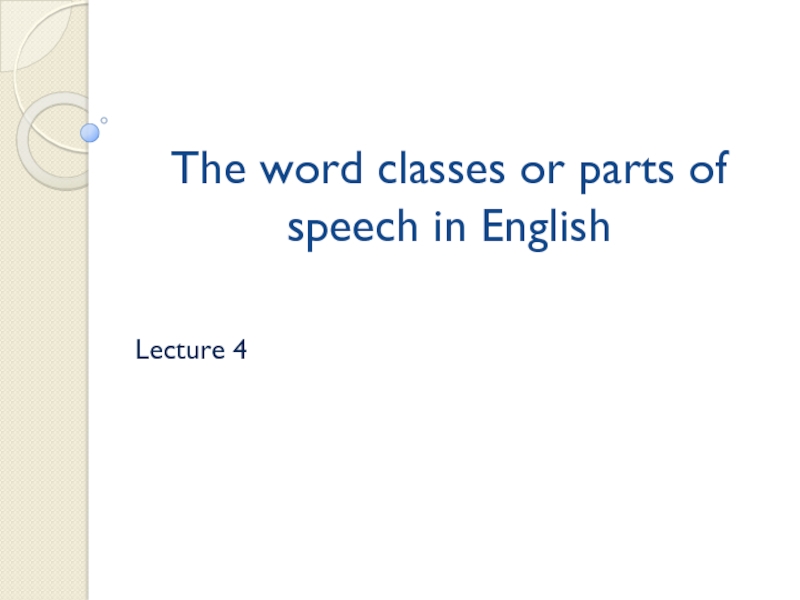
Слайд 2Lecture outline
Parts of speech: a historical perspective
Traditional approaches based on
various criteria
Debatable issues
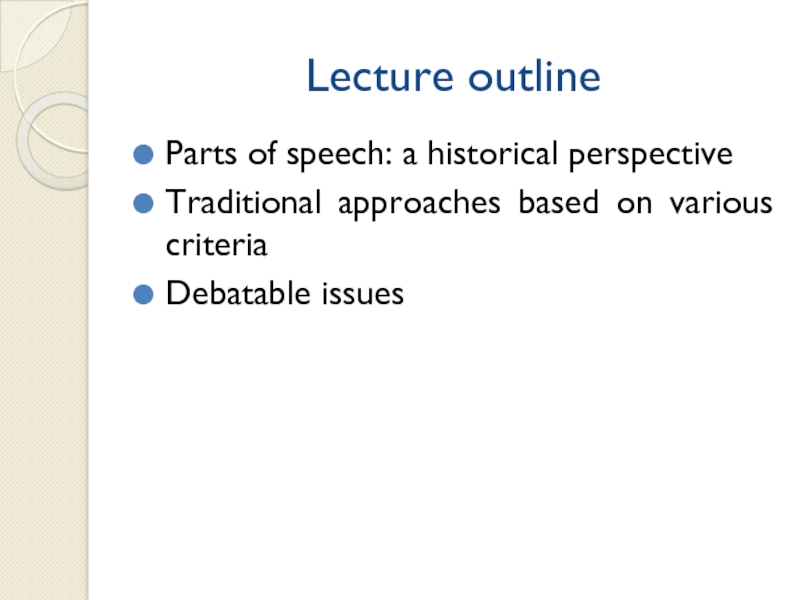
Слайд 3The word
A meaningful, expressive, nominative unit of language;
Belongs to a
particular language level;
Consists of form and meaning (signified and signifier).
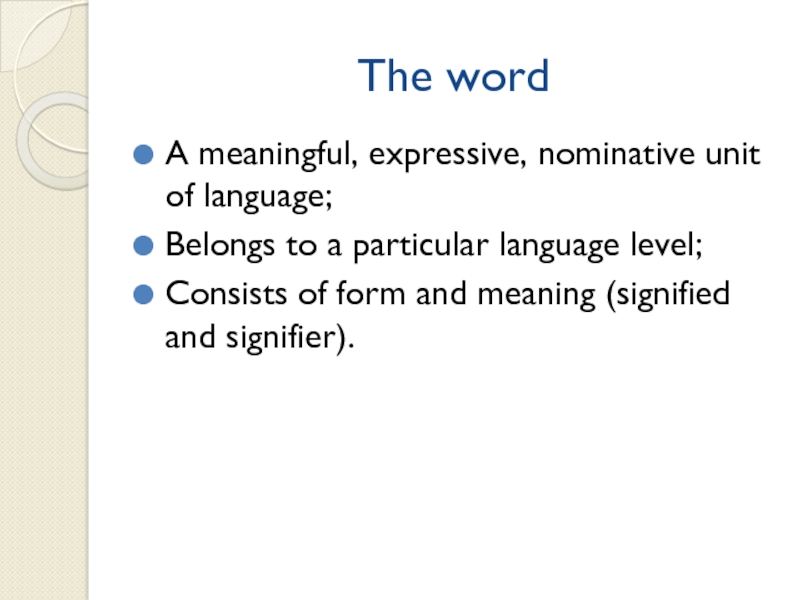
Слайд 4Groups of words in lexicology
Semantic classification of words: synonyms and
antonyms;
etymologically: words of native origin and borrowing;
stylistically: neutral or stylistically
marked;
frequency: active and passive, etc.
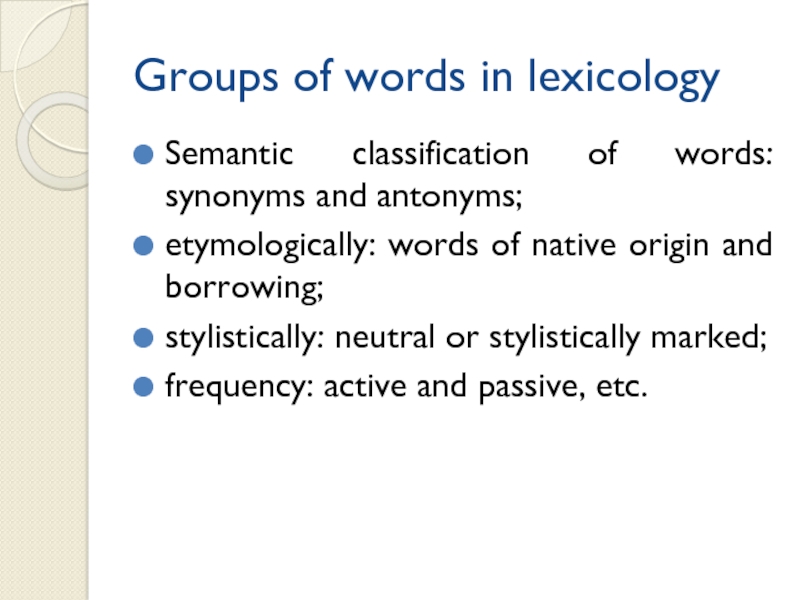
Слайд 5Classes of words in grammar
Grammar organizes the words into
a comparatively small number of classes:
grammatically relevant classes;
traditionally – parts
of speech (from Ancient Greece, rather confusing);
the system of the parts of speech is historically variable.
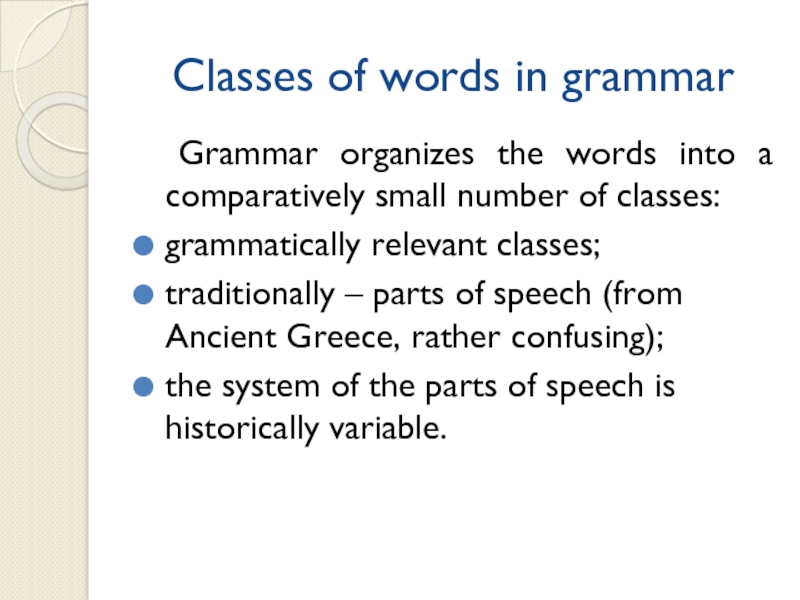
Слайд 6Lexical and grammatical properties of the word
A word has a
certain lexical meaning: the individual meaning of the word (chair
– a definite piece of furniture);
it also possesses a more general and abstract meaning – grammatical meaning, the meaning of the whole class or subclass of words (thingness, countableness of ‘chair’).
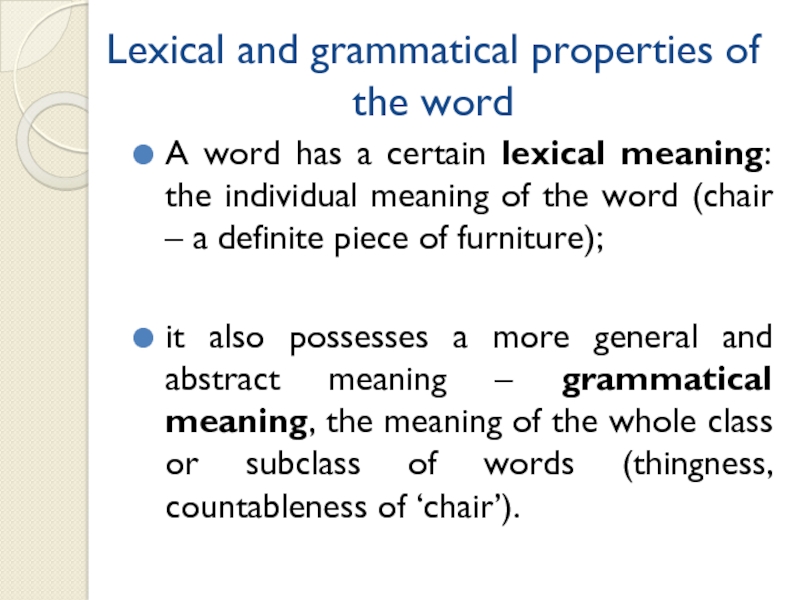
Слайд 7The grammatical meaning
The grammatical meaning is a generalized, abstract meaning,
which unites big sets or classes of words and is
expressed with the help of characteristic formal markers or their absence.
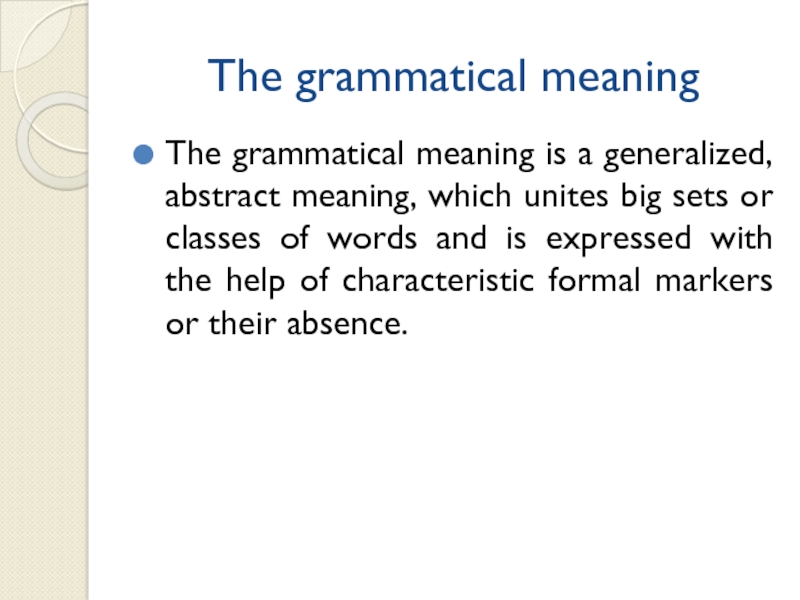
Слайд 8
The historical perspective
Prescriptive grammars
Latin grammars;
declinables (nouns, adjectives, pronouns,
verbs, participles) and indeclinables (adverbs, prepositions, conjunctions, interjections, articles);
the number
of parts of speech varied from author to author: for instance, nouns and adjectives formed one part of speech.
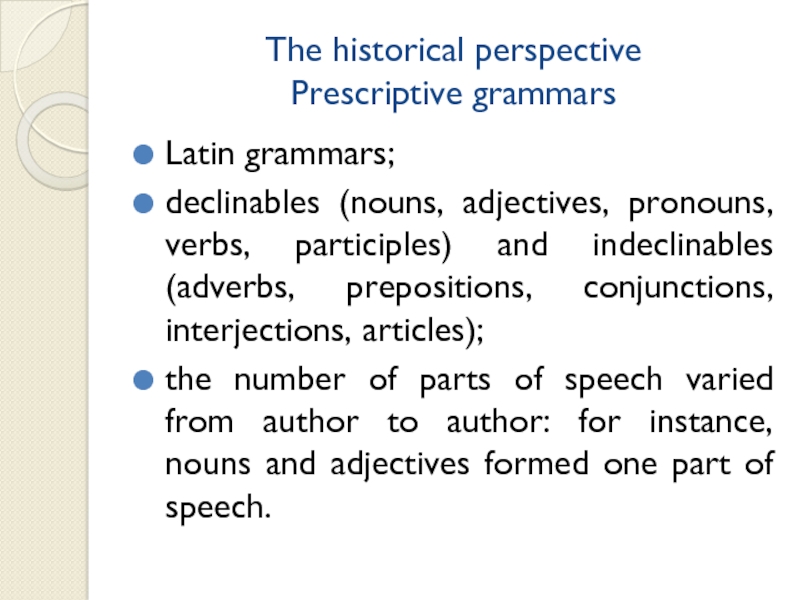
Слайд 9The historical perspective
Non-structural descriptive grammars
Henry Sweet: declinables and indiclinables (based
on form, meaning, and function):
Declinables:
noun-words (noun, noun-pronoun, noun-numeral, infinitive,
gerund),
adjective-words (adjective, adjective-pronoun, adjective-numeral, participle),
verb (finite verb),
verbals (infinitive, gerund, participle).
Indeclinables:
adverb,
preposition,
conjunction,
interjection.
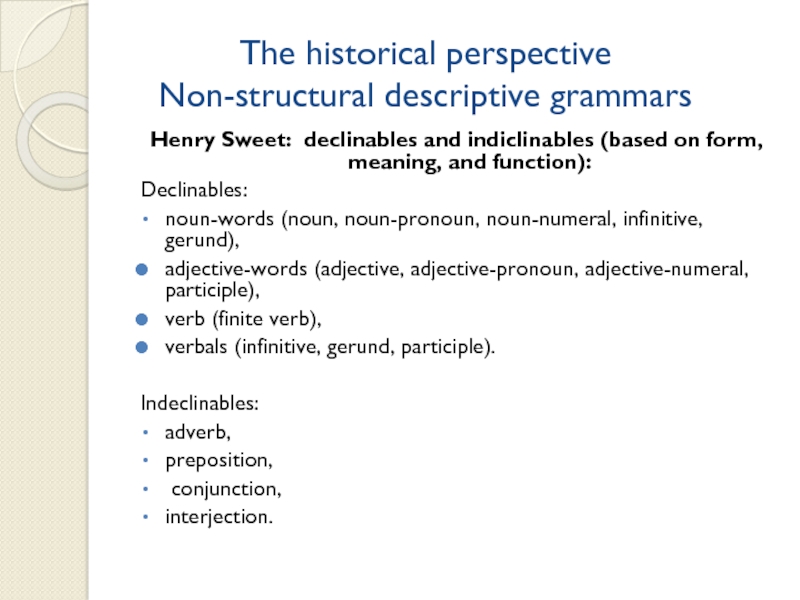
Слайд 10The historical perspective
Non-structural descriptive grammars
Otto Jespersen (form and function)
substantives,
adjectives,
pronouns,
verbs,
and particles (adverbs, prepositions, conjunctions, interjections).
Otto Jespersen
(function in a sentence):
primary, secondary, tertiary word.
A happily laughing child
(3) (2) (1)
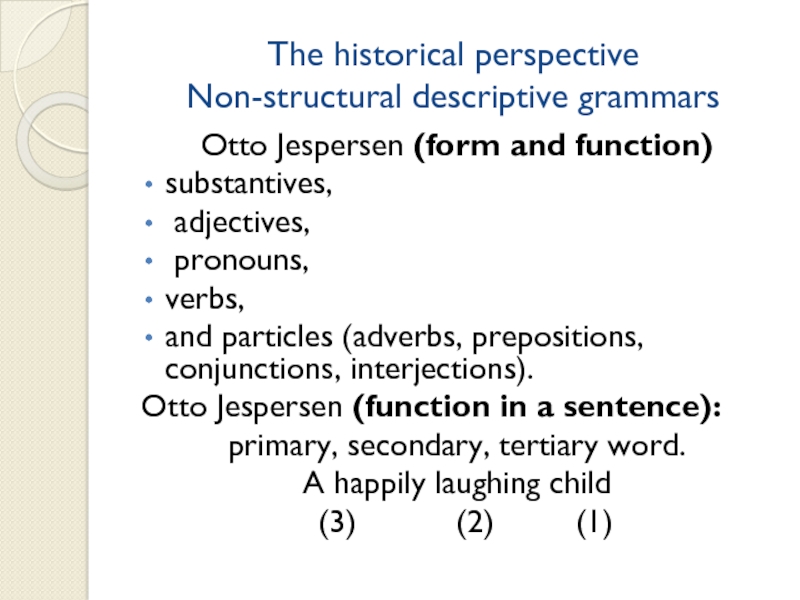
Слайд 11The historical perspective Structural Descriptive Grammarians
Charles Fries , syntactic and
distributional analysis
(the combinability tested by substitution)
Words that exhibit the
same distribution (which is the set of contexts, i.e. immediate linguistic environments, in which a word can appear) belong to the same class.
Frame A: The concert was good.
Frame B: The clerk remembered the tax.
Frame C: The team went there.
Class 1 words (all words that can take the position of the words ‘concert, clerk, tax, team.
Class 2 words (was, remembered and went).
Class 3 words (good).
Class 4 words (there).
15 groups of function words: Group A (determiners), Group B (modal verbs, Group C (the negative particle ‘not’), etc.
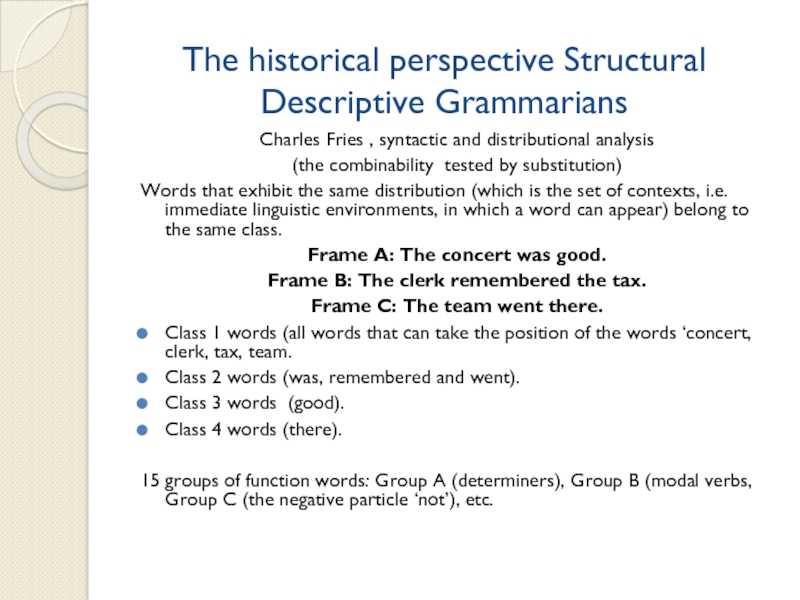
Слайд 12Modern traditional approaches
The criteria:
semantic (generalized meaning) – meaning;
formal (inflexional
an derivation features) – form;
functional (syntactic role) – function.
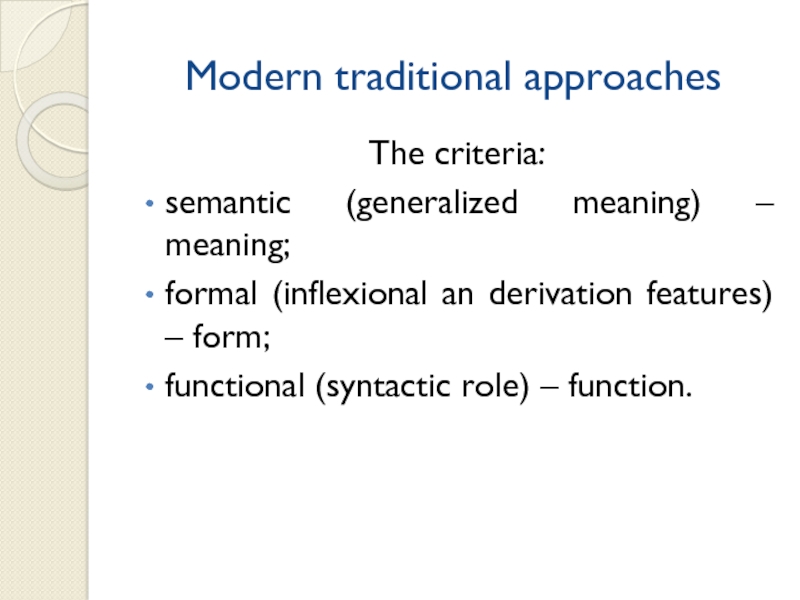
Слайд 13
Modern traditional approaches (1)
Notional (having independent lexical meaning): noun,
adjective, numeral, pronoun, verb, adverb.
Functional (deprived of independent lexical meaning):
article, preposition, conjunction, particle, modal word, interjection.
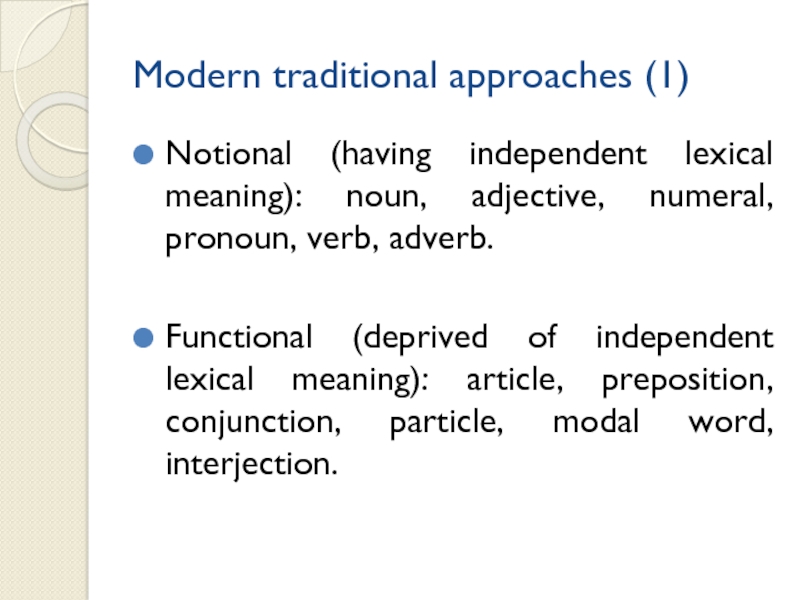
Слайд 14
Modern traditional approaches
The Noun
meaning: ‘thingness’;
form: the changeable forms of
number and case (dog’s, dogs) and suffixal forms of derivation
(happiNESS, childHOOD, etc.);
function: subject, object, substantival predicative, preposition connections, modification by an adjective.
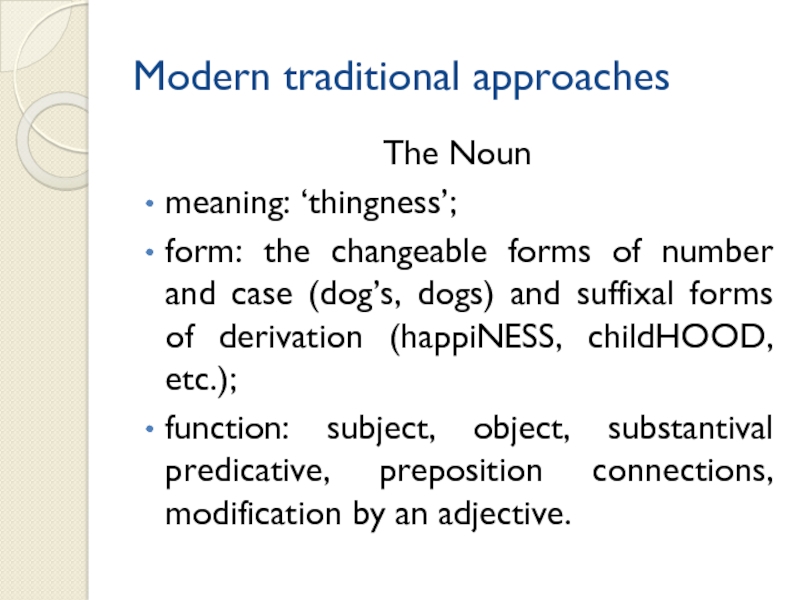
Слайд 15The Noun (function)
Subject: The boy is very happy.
Object: She saw
the boy.
Substantival predicative: This is a boy.
Prepositional connections: He came
up to the boy.
Modification by an adjective: He was a clever boy.
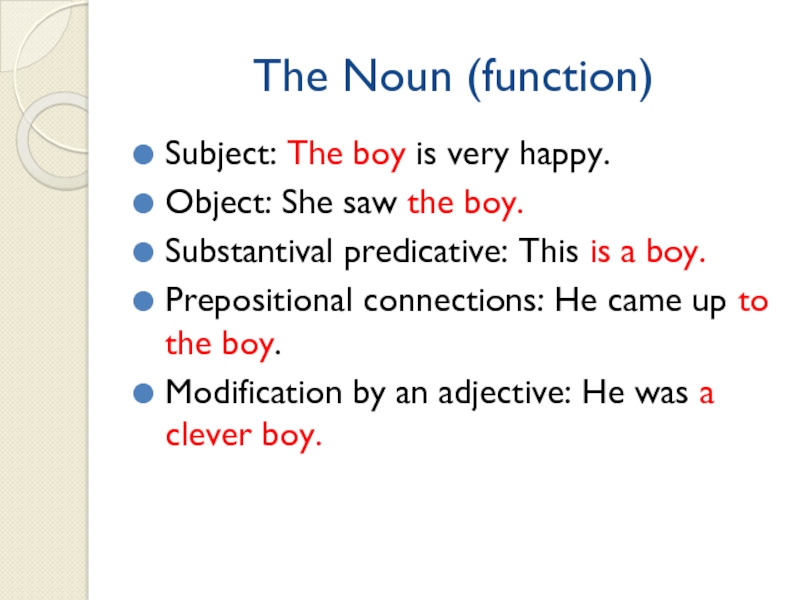
Слайд 16Functional words
The preposition expresses the dependencies and interdependencies of referents.
The
article expresses the specific limitation of the substantive function.
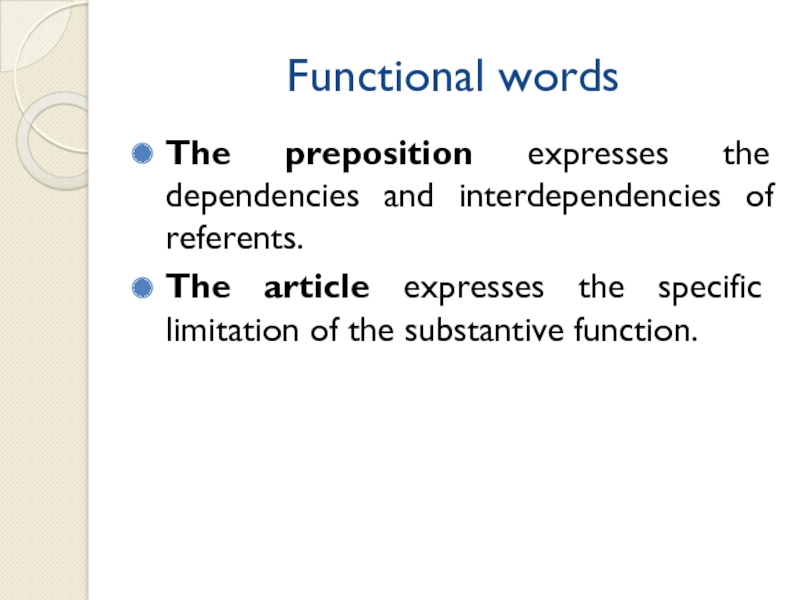
Слайд 17Subclasses:
the noun
Proper and common (the Danube vs. a girl;
Animate and
inanimate (a man vs. a chair);
Countable and uncountable ( a
dog vs. information).
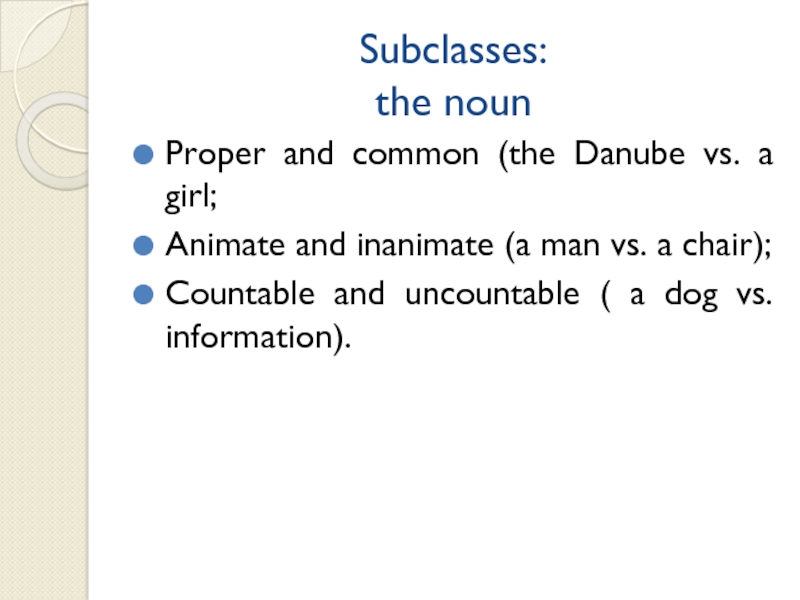
Слайд 18Modern traditional approaches (2)
A part of speech is a class
of words characterized by:
Its lexico-grammatical meaning;
Its lexico-grammatical morphemes;
Its grammatical categories
or its paradigms;
Its combinability;
Its function in a sentence.
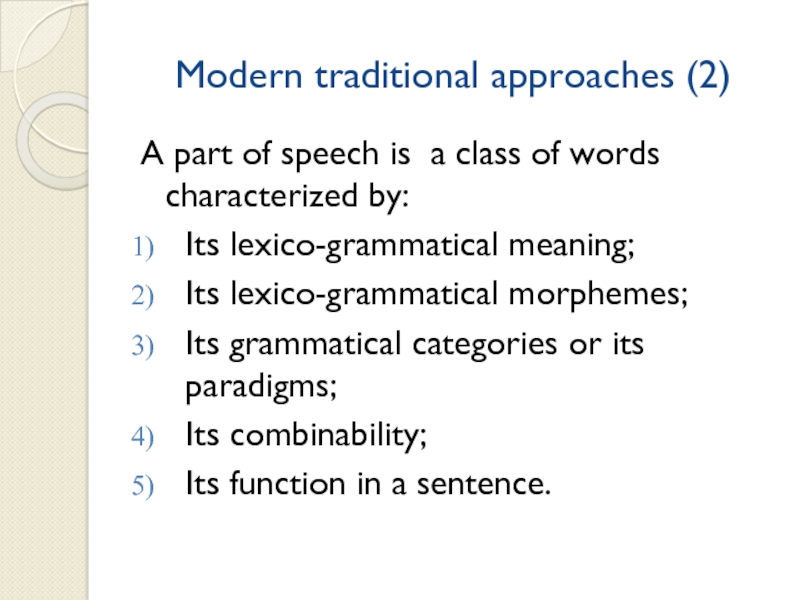
Слайд 19Modern traditional approaches (2)
lexico-grammatical meaning: nouns ‘substance’, verbs ‘action’, etc.;
lexico-grammatical
morphemes: -ness, -ist, -ism; -ize, -ify; -ful, -less,
-ish, etc.;
grammatical categories of paradigms: case and number for nouns (dog vs. dog’s, dog vs. dogs); tense, mood, voice, etc, for verbs (walk, walked, is walking, has walked, etc.).
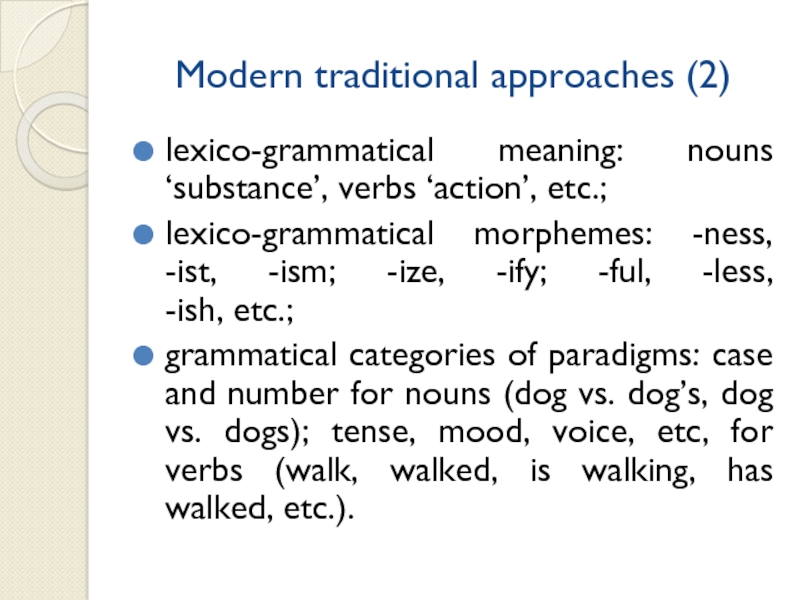
Слайд 20Modern traditional approaches (2)
combinability (the power of words to form
combinations of definite patterns with word of certain classes): nouns+
prepositions, but * preposition+ adverb (*for loudly);
function in a sentence.
The words often lack one or more features.
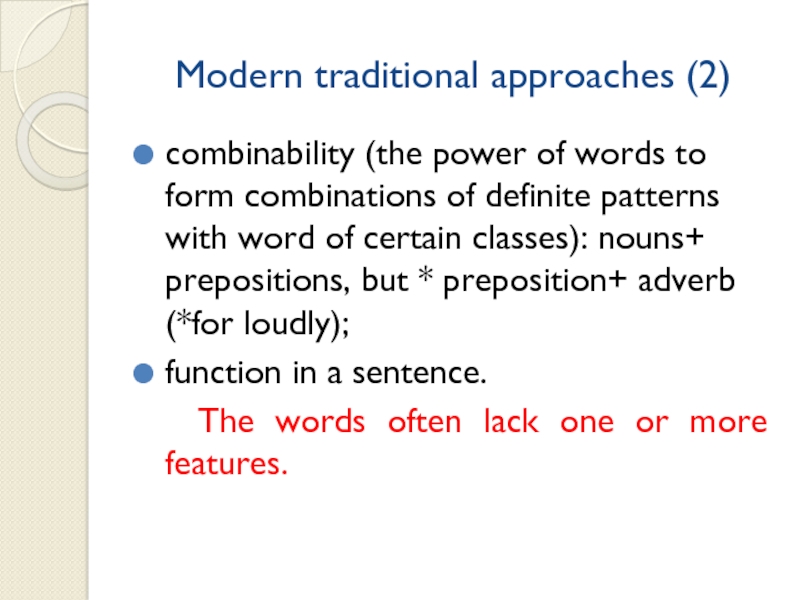
Слайд 21Modern traditional approaches (2)
Nouns, adjective, pronouns, numerals, verbs, adverbs,
adlinks (the category of state: seem, look), modal words, prepositions,
conjunctions, particles, interjections, articles, response words (yes, no);
notional vs. semi-notional.
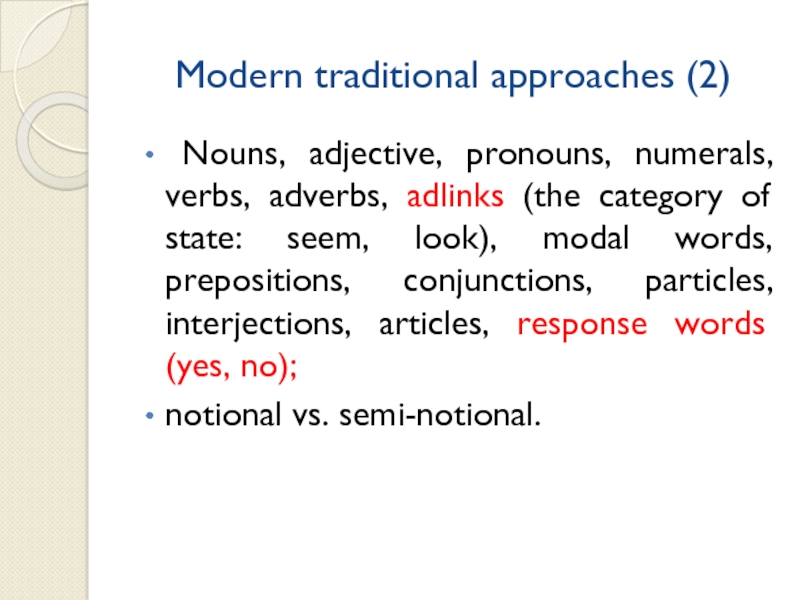
Слайд 22
Semi-notional parts of speech
very general and comparatively weak lexical meaning
(rare or no substitutes);
unilateral or bilateral combinability (1) articles; 2)
preposition);
the functions of linking or specifying.
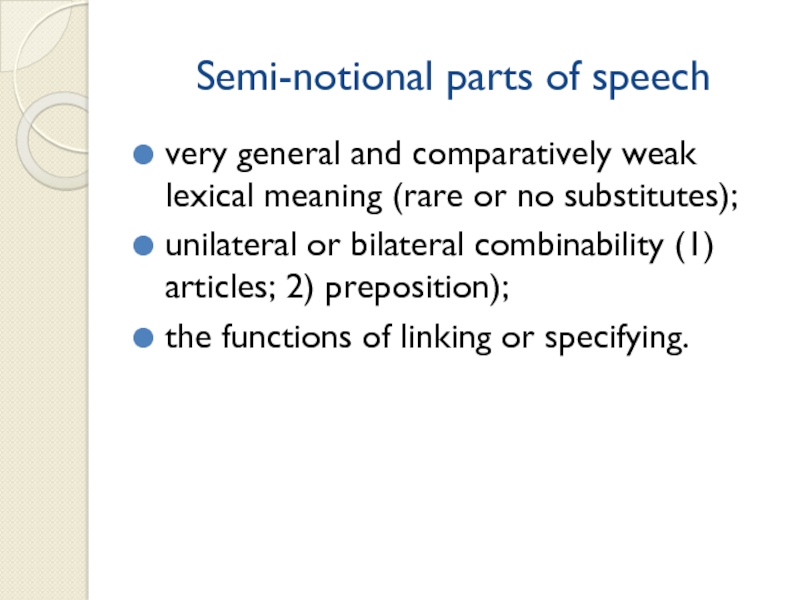
Слайд 23The latest approach
(form and function)
“A Comprehensive Grammar of the English
Language”;
word classes are the most general categories to which lexical
items can be appropriately assigned (state further subclassification).
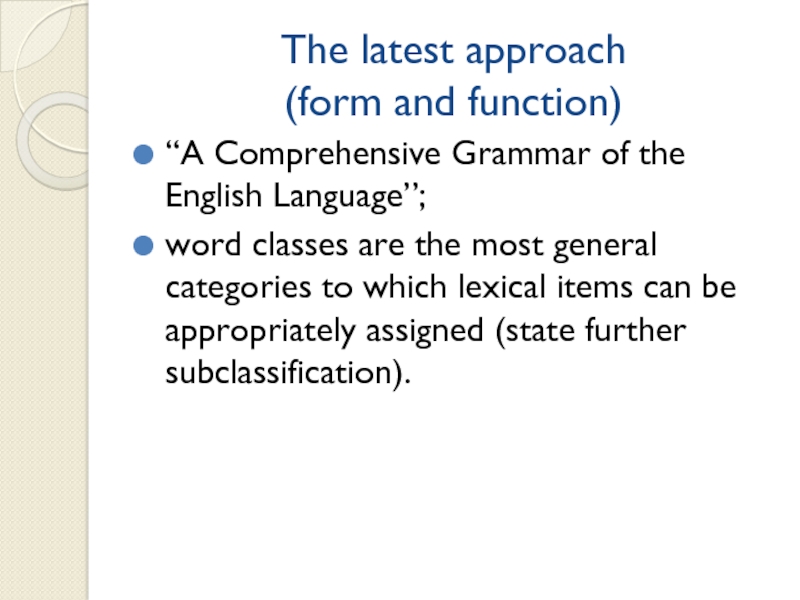
Слайд 24The latest approach
Closed classed (only exceptionally extended by the creation
of additional members);
Open classes (indefinitely extendable);
Numerals (between open-class and closed-class
items);
interjections (a closed class – fully institutionalized and few in number, but are grammatically peripheral);
a small number of words of unique function.
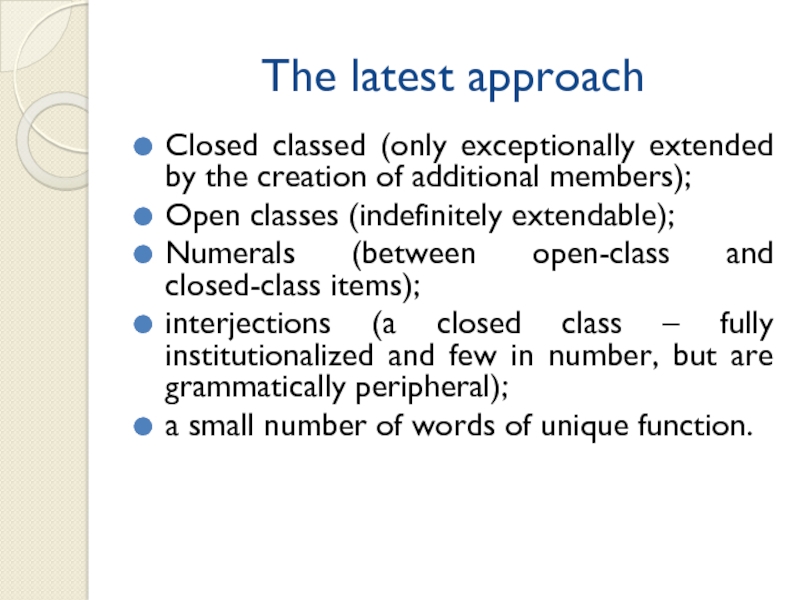
Слайд 25The latest approach
Closed classes: preposition – of, at, in, without,
in spite of; pronoun – he, they, anybody, one, which;
determiner – the, a, that, every, some; conjunction –and, that, when, although; modal verb – can, must, will, could; primary verb – be, have, do);
Open classes: noun – John, room, answer, play, adjective – happy, steady, new, large, round, full verb – search, grow, play, adverb – steadily, completely, really;
Numerals – two, three; first, second, third;
Interjections – oh, ah, wow etc;
words of unique function – the negative particle not and the infinitive marker to.
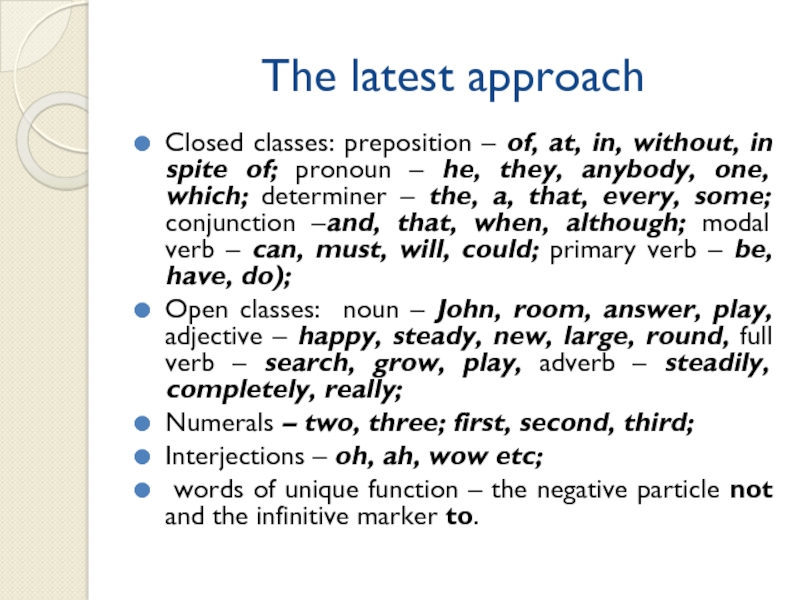
Слайд 26
Disputable points in the parts of speech classification
Nouns, verbs and
their properties are agreed upon by most scientists vs. particles,
modal word are more problematic;
Adverbs (a dustbin (F.Palmer), мусорная куча (V.Vinogradov): perfectly vs, again; after all, anyway, actually, etc.
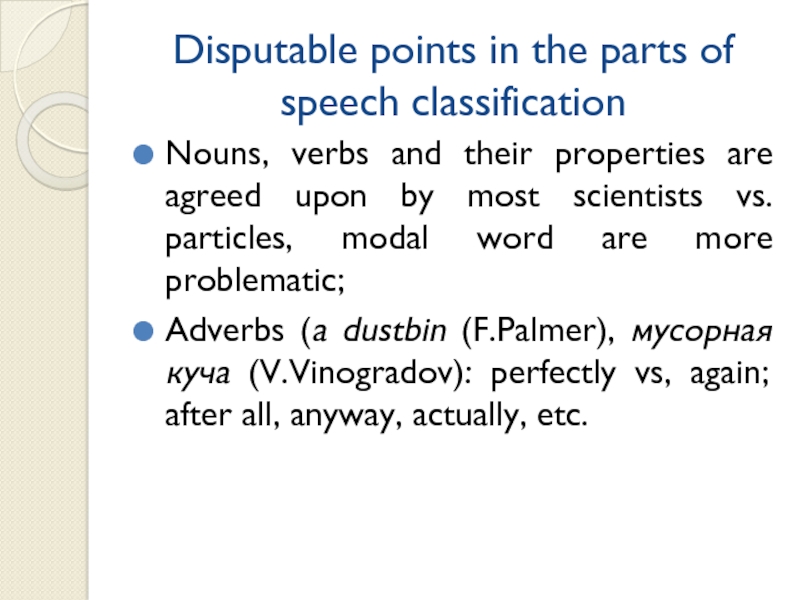
Слайд 27
The theory of field structure of the parts of speech
(V. Admoni)
Each part of speech has units (words) possessing all
the features typical of that parts of speech – the centre of the field;
there are unit which have some features only (periphery).
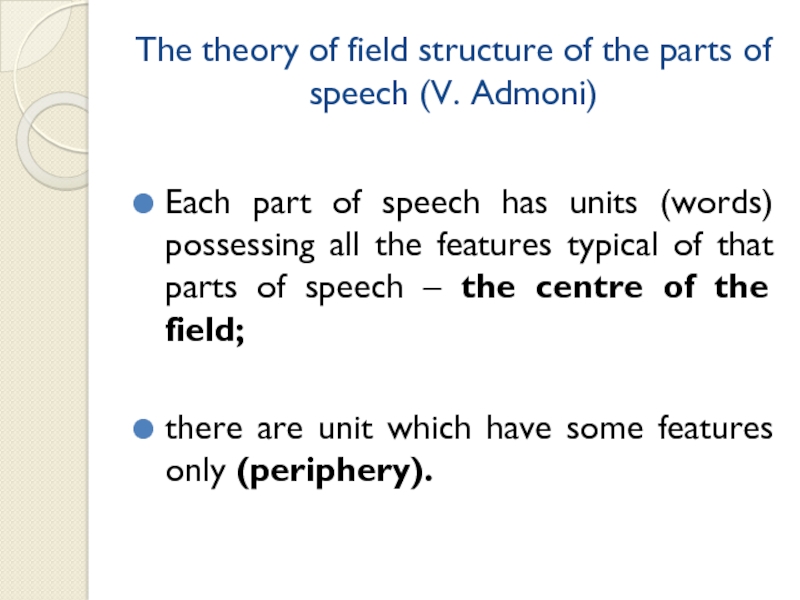
Слайд 28Conclusion
Parts of speech are lexico-grammatical classes of words.
The classification can
be based on various criteria: formal, semantic, functional, or all
of them together.
Part of speech are historical variable.
There are problematic points which require solving.
